#and the reason I think she's a good villain is because she brings up very good points about the world they live in
Explore tagged Tumblr posts
Text
Wasn't it because creating the stone is likely to kill the creator? Like Hohenheim died when he created the first stone which Dante used to attach his soul to another man's body. They kept using the stone to hop bodies and later Danté decided she needed someone else to create the new stone because she didn't want to die while creating it. The only other person who created the stone also died (Scar), though his case is pretty complicated.
Sorry for saying this but Dante, the final villain in Fullmetal Alchemist 03 is one of the most incompetent villain's I've seen. Or rather, for all the talk about her being a powerful alchemist she doesn't live up to the hype.
Her plan is to cause misery upon people in the hopes one of them starts searching for the philosopher's stone out of desperation. Then, when this potential person then creates a stone she'll take it from them and use it to keep herself young/hop body to someone younger and prettier. The reason she needs someone else to create the stone is because she herself don't know how to create one. This 500+ years old woman, who was right next to Hohenheim when he created a stone, someone who knows the ingredients to a philosopher's stone, somehow doesn't know how to create one.
I can buy Hoenheim hiding the specifics of how it's done from her, but that she still doesn't know after 500 years? That she needs Ed, a fifteen year old who only studied about the stone for about four years, to create one for her instead of her doing it herself. It doesn't make sense.
The only "amazing" alchemy thing she seems to have done is to create Pride, a homunculous who can age, but how she did that is never explained.
#i also dont think she was set up as some amazing prodigal alchemist#like she's good considering her creation of pride as well as bringinf Ho's soul back from the dead and attaching it to another person#and she did the latter with a stone#she's good with alchemy but she's just a bad and vain person with a lot of power#and i dont think there is anything wrong with a villain wanting eternal youth and beauty#considering women aren't the onlt villains obsessed with appearance take Greed for example#i also think Dante while a bit of a missed opportunity as a villain was a good villain in general#she was there to force Ed to confront the flaws of his ideology giving him the final blow that the main law he had hinged everything on#was ultimately just smoke#and that's a thing with fma it rarely has any true display of power in important conflicts#and more often it was about a battle of ideologiesand beliefs#and i dont think she was trying ti create misery to force someone to create rhe stone#more like she was trying to create a circumstance where the erasure of an entire civilization could be written off as a result of war#and there is also the idea of her playing God#she's an immortal for all intents and purposes and she often acts like humans are beneath her and that she is somehow above them#and she acts like an uncaring callous and cruel god who ruins lives and makes people suffer because why the hell not?#she views them as playthings#her obsession with youth and beauty is less about wanting to stay beautiful and young and therefore typical feminine vamp tropes#and more about aging and death bringing her closer to the humans she considers herself to be better than#and the reason I think she's a good villain is because she brings up very good points about the world they live in#she has a different perspective and she slices open the hypocrisy and facades presented in the fma universe as absolute truths from day 1#and the thing is she's right and even Ed knows it
29 notes
·
View notes
Text
No one has ever thought about Blitzo's perspective and I think that's the problem: a tiny analysis/essay
I was rewatching season 2 episode 6 when something kind-of rubbed me the wrong way, and it was how Fizzarolli described the fire.
He states:
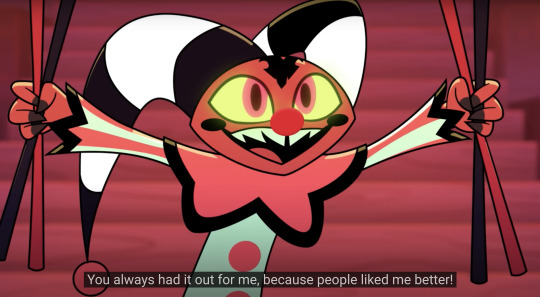
And I'm a fizz lover- dont get me wrong- and I understand he was angry and obviously not in the correct mindspace at this point in time-
But this type of comment seems so unfair considering how unfair the circus life for Blitzo was. He mentions how he's angry at Blitzo for being jealous of him- but he never addresses why Blitzo is jealous. Fizz has never (on screen) addressed or even acknowledged how unfairly Blitzo's father treated him and how Blitzo had it harder in life because of that.
I feel like it would hurt so much if your best friend was so blatantly favored by your own father, the father that abused you (I think selling your kid and forcing them to steal without a care for the child's safety counts as abuse), and your best friend never acknowledged that situation and held your jealousy against you?
Barbie does a similar thing on a more extreme level, only thinking about how the accident, the fire, losing their mother, was hard FOR HER. And if you look at Barbie, she doesn't really seem to have any scars (besides on her tail, and the tattoos on her body). Therefore we can assume that Blitzo sustained more physical injuries than her - in addition to losing their mother. Yet its all about how hard it is for her.
So far no one in the series has really ever looked past Blitzo's hard persona and think about maybe why he does the things that he does.
this obviously results in Blitzo blaming himself for the fire- besides the one "You have no idea what I lost in that fire" Blitzo never ever brings up how hard the fire was for him. He never ever allows sympathy to be directed his way in relation to the accident, not from himself or anyone around him. He's convinced he's the monster, the villain of the story. It's why, every single time the fire is brought up, he is solely focused on apologizing, on taking the blame, taking the blows from Fizz/Barbie. He never defends himself. Never once does he try to seek any comfort for himself, not once does he make it about him.
My problem is that everyone lets him.
Everyone sits back and watches as he takes the blows for everything. As if its all his fault. They place the blame on Blitzo because its easier, easier than acknowledging Blitzo's pain too.
Which brings me to Stolas.
In this current Stolas situation, where Stolas goes wrong is by repeating this same behavior that Blitzo was faced with when it came to Barbie and Fizz after the accident. Something happened, people were hurt, Blitzo was hurt, Stolas was hurt- but of course it's all Blitzo's fault - it's always Blitzos fault. Stolas takes very little blame for what happened, even though he very much is equally to blame as is Blitzo.
Also note here: Blitzo has his flaws and he does make mistakes that he needs to take responsibility for. This is not to say he is 100% innocent, he's just not 100% to blame either.
Its always Blitzo who needs to apologize, Blitzo who ruined the relationship, Blitzo who broke Stolas' heart, Blitzo who ruined Barbie's life, Blitzo who destroyed Fizz. This pattern happens so much that Blitzo's turned it into a core belief: when something bad happens, he's at fault. He's the reason behind all the bad things that happen. He's the common denominator.
Which is how we got to today: he doesnt believe he deserves love, sympathy, or comfort: because he believes hes the sole cause for all this pain: therefore why should he feel happiness when all he does is take other's away? Why should he allow himself to be loved by Stolas when he hurt Barbie so badly? When he ruined Barbie's chances at love? At a good life?
It's like he's constantly punishing himself for something he thinks he's responsible for. He thinks he deserves to be miserable as some sort of pay-back for ruining everyone's lives.
And you can see as he desperately tries to act the opposite now. It's subtle, because he has to keep up his hard exterior, but its there.
Every single one of his relationships (besides those from childhood) were created because he wanted to help. Adopting Loona to help her escape foster care, befriending Moxxie and helping him escape the abuse of his father and the mafia, befriending Millie (which we don't know their back story yet but i assume he also helped her out of a bad hole, maybe by offering her a position at IMP? We will see!).
I just think he doesnt get the credit he deserves.
I think if just one person acknowledged what happened to Blitzo, allowed Blitzo to be vulnerable, allowed him to express his feelings, allowed him to grieve and mourn the things that happened to him: he would be able to move on, and improve.
It's even worse that some of the people who are the worst offenders are also the ones to claim they love him. Verosika, Stolas, Fizz, etc. They like him for the fake persona he puts up. This enforced Blitzo's belief that he must repress things, that they wont love him if he were anyone else- if he showed his true scars and trauma and if he showed how soft he really is. They love him for his fake persona, not really for him.
So he lashes out. He's shitty. He pushes them away.
And when he does let some of that vulnerability slip? He's shit on for it. When he expresses it to Fizz, Fizz covers up his words with "Glad you could admit it, want a medal?" The only small reprieve Blitzo got was when Fizz said "I guess you didn't really ruin my life."
When he expresses it to stolas "Treat me like one of your butler imps!" Stolas's response is "You think that little of me?"
Which isnt an invalid response point to bring up (and definitely needs to be addressed, which I think Blitzo is getting to bc he's becoming very aware of his other shortcomings), but at the same time Stolas has the responsibility of thinking about why Blitzo would think that. Stolas has never really listened to Blitzo when Blitzo doesnt fit into this mold that Stolas made up of him. When Blitzo gets angry and expresses how Stolas makes him feel:
"Dont act like this is anything more than you wanting me to fuck you" "You can't just throw this feelings bullshit on me" "give me a second to think!" "Oh, sorry, this entire time I assumed the worst because I was convinced a prince could never love someone like me and I've let my self hatred stop me from apologizing to anyone I could ever care about!" "How could you ever actually care for an imp… Me? How could anybody?"
He's always faced with Stolas bringing it back to...well.. anything else. He either ignores the comment all together or he goes into what he wants.
And Blitzo isnt perfect either, but I feel like we all know that. I think that everyone is well aware of how shitty Blitzo can be, but no one really addresses everyone else. Which is why i'm not getting into Blitzo's flaws, because those are a lot more obvious.
So yeah, thats why I wanted to post this lil analysis. Also because its fun to break apart their relationships and wonder why they said the things they said, get a better understanding of the story and the characters. I could be totally off with all this but I had fun writing it lol.
This is not a blitzo/stolas/fizz/etc hate post AT ALL. I love everyone and think that the story will show us who they are.
Let me know if you agree or disagree!
#helluva boss#stolitz#blitzo#hellaverse#stolas#helluva boss blitz#blitzo x stolas#hazbin hotel#helluva boss blitzo#helluva boss analysis#stolas goetia#hb stolas#verosika mayday#fizzarolli and blitzo#helluva boss fizzarolli
316 notes
·
View notes
Text
On Arcane & Antivillains

One thing I really enjoy about Arcane is how it handles antivillains.
For one, most of the characters (main ones) would actually fall into the category of antivillain at one point, or in the case of our two protagonists, become one. Arcane is arguably ripe with them.
An antivillain is essentially the opposite of an antihero. Simplified, antiheros do good things out of selfish or questionable motives, antivillains do things that are objectively bad or evil, but for noble reasons or for a greater cause. Another term for them is "sympathetic villain" however that term is too vague (there are villains out there who are sympathetic, but are none the less traditionally evil and therefore do not qualify as antivillains), and "antivillain" is a much better term mirror to "antihero." A common thread I've noticed among antivillain characters is some level of a Machiavellian approach to achieving their goals - the ends justify the means type of philosophy is something you'll always find characters that fit this category. At the very least, they dabble with it. In their eyes their actions are always justified because they're fighting for a good cause.
To put things into perspective, I'll use two examples. Harley Quinn shifts around, but she is frequently an antihero, take her depiction in both Suicide Squad movies. She does take down bad guys, however she's not doing so out of a sense of altruism, but to get a reduced prison sentence. Very cut-and-dry example of antiheroism.
On the flip side you have Magneto. Now from what I've seen (I've dabbled in the comics, but haven't dived in all the way) in the comics he gets very dark with the antihuman action. But in the Xmen movies, he definitely does some down right villainous stuff, but his intention remains the same - he wants mutants to live in a world free of bigotry and he's willing to do anything necessary to achieve that, including committing atrocities.
Now if this sounds very confusing to you and you swear you've heard these terms interchangeably or that you can think of several characters that are labeled as type A when they should be type B or vice versa, that's pretty normal. These aren't archetypical heroes and villains we're talking about, so it can be hard to categorize them, and honestly most characters in general will go back and forth or shift at one point or another, so all you need to know is that those definitions are the ones we're working with in this post.
Here are the characters from Arcane that I think suit this label, and others that I think will.
Disclaimer: this is not me hating on the characters. I love all of these characters for this layer to their character. This is not a "oh, look, this character is bad actually," post. If anything, consider it a celebration of their gray morality and how well its explored in the show.
Silco
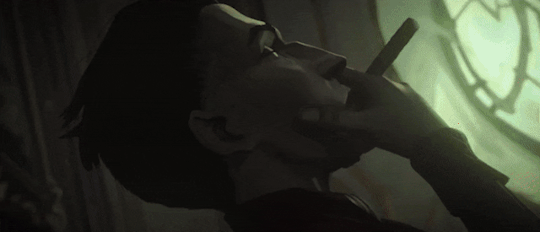
Duh. Silco is objectively pretty evil. Setting up a drug empire that destroys your own people, getting in-cahoots with corrupt cops, killing kids, and aiding in destroying a young girl's mental health is multiple levels of foul. However, for him, all of this was part of an elaborate plan to liberate Zaun, which is being aggressively oppressed by Piltover. They were necessary sacrifices made to the cause, and worth it because it will bring forth better days for him and his people. Now obviously, a lot of his actions definitely have to do with his own ego, however the only time Zaun isn't prioritized is when it comes to Jinx, who is like a daughter to him, and even that realization comes to smack in the face late in his arc.
Sevika

I'd argue she's even more noble than most since she truly is rooted in the cause for Zaun. Not only is she willing to do some pretty bad things for the "greater-good", she's even willing to betray people who she views as unfit or incompetent. And what's even more telling is that she doesn't do this for power (which is arguably a part of Silco's prerogative). Sure, she's his #2, but he doesn't exactly show any favoritism. And Sevika seemingly isn't even trying to become the new leader of Zaun after Silco's death from the season 2 clips, but will support Jinx, despite the fact that she probably could dethrone her. She's no true blue hero, but she's not a megalomaniac either.
The Entire Council of Piltover (Minus Mel & Jayce)

As obnoxious as they are, none of them are mustache-twirling villains. As we see with characters like Sheriff Grayson (not a council member, but they share the same sentiment), they legitimately think they're protecting the city with their neglectful leadership and oppression of Zaunites. Yes, this includes Heimerdinger, who seemingly only started caring about Zaun once he was booted out of the council, so that places him firmly in antihero territory in my opinion.
Why did I exclude Mel and Jayce? Their plots are actually upward in terms of morality, especially Jayce who by the end is closer to being a traditional hero by prioritizing peace and progress over the status quo or war, and actively makes the first move of trying to right Piltover's wrongs. Mel's arc has also moved this direction as well, as she went from arguing that Jayce and Viktor should build Hextech weapons in case of war with the Zaunites, to fully embracing peace. You could argue that Mel wanting the weapons means she was at some point an antivillain, and I might agree, but as it stands, she's firmly in the clear.
So, why are the rest of the council still considered antivillains? Honestly, we just don't know much about their motivations to say. They ultimately did a good deed in voting for peace, but you know, one good deed doesn't wash-out the bad and vice versa. They're not even on thin ice for me, they're still fighting for the surface.
Marcus

Questioning your actions does not mean you can't be an antivillain, and Marcus is a good example of that. He's is kind of like Caitlyn if she were way less compassionate and very incompetent. Marcus does not think his actions are evil, according to show runners he only places Vi in Stillwater to protect her from Silco; he gets involved with Silco because he wants justice for the building explosion and it goes out of hand. That said, he also threw a child into a dangerous prison with no charges and with the intention of keeping her there for life, and worked with a kingpin who was actively antagonizing his own people while reaping benefits from an abusive system. So yeah, Marcus falls more into being an antivillain than full-blown villain, he's still firmly an antagonist though.
Ambessa

I know it's very popular in the fandom to call Ambessa a traditional bad-guy type of villain, but she is actually very nuanced. For one - she does not see her actions as evil, nor are her motivations behind doing them rooted in it. Ambessa, as she states in Mel's flashback, was raised in the Noxian way. Her grandfather literally made her search the dead bodies of the people they massacred when she was a youth, and she was indoctrinated to believe that this was in the best interest of her family and the Noxian people. By showing strength and ruthlessness, she's telling the rest of the world: "Stay away from House Medarda and Noxus." Hence, why Kino's death wrecks her, because she values herself over how effective she is at warding people off from messing with her family. Her main reason for getting involved with the war between Piltover and Zaun will 100% be because Mel's life was nearly lost due to Jinx's bomb, and this is coming straight off of her son's death mind you. So, while Ambessa may definitely be one of the most ruthless people on this list, she is not at Palpatine levels of evil yet, not by a long shot.
Jinx

You guys saw this coming, right? This barely needs an explanation. Jinx grew up in the Lanes, was a victim of Piltover's oppression multiple times throughout her youth, was willing to fight for their freedom as seen in episode 2, and in the end, that desire, along with her being adopted by Silco, manifested in her doing multiple acts of violence, including terrorism against Piltover, which frequently hurt people who weren't guilty of anything. (No, blowing up the building in episode 3 doesn't count as one of her evil deeds because it was an accident.) We understand completely why Jinx does what she does, even though it hurts to see her slip farther and farther into this mindset.
Vi

Way more subtle (for now) but I'd argue she's there come episodes 8 and 9. Hell, you could argue that her arc is about her sense of morality breaking down due to realizing how impossible the situation between Zaun and Piltover is, and embracing an "ends justifies the means" type mindset that Vander tried to sway her against back in episode 2. Wanting to stop a kingpin from using this new dangerous drug to destroy your city and sister? A noble cause, indeed. Not really caring that (or being passive over the fact that) children die in process because of their approximation to said bad guy? Yikes. [EDIT: Since we're on this topic: here's a link to where I explored this aspect of her character. I did this a while ago, but I thought it best to include it here too for added context). Now, I know what some of you are going to say - how is this any different from, say, Steve Rogers telling Wanda Maximoff that sometimes there's collateral damage when doing hero work? The difference is that Steve didn't argue that those people had it coming because they're associated with the bad guys/or in their way, which Vi does. That's some dangerous conviction right there, and we'll probably see that elaborated on in season 2 given that she's becoming an Enforcer which is a position that lends itself to abuse of power (and if it goes anyway like things do with her game counterpart, she will engage in police brutality and not see an issue with it, but given that Arcane's Vi is way more well, nuanced, than her game counterpart I don't think it will go on for long). While we're on the topic of Vi, according to her prison records, she had a notorious reputation while doing time to the point that I find it funny Silco didn't put 2-and-2 together that the girl with short pink hair beating the shit out of and attempting to murder all of his goons that went to Stillwater was possibly the same girl that wiped the floor with those same goons the night Vander died.
Potential Antivillains of Season 2:
These are characters that I predict will become antivillains at some point during season 2 based off of where their season 1 arc left and clues from season 2 teasers and clips. This is not me saying for sure this will happen, only a prediction. But if it does come true, I will gladly collect $5 per accurate plot point.
Viktor

Two words: glorious evolution.
We all love Viktor. We all love good-guy Viktor, and we will also more than likely love not-so-good-guy Viktor due to how complex that arc will be. If it will go anything like his game-lore (which I suspect it will) his noble intentions will never leave him, just simply evolve to include some less-than-heroic actions and justifications. He still wants to improve the undercity, and well, humanity overall, with hextech, motivated by the injustices he's been put through his own life and his illness, but he will go about it in some very unorthodox ways, and his arc in Arcane is about him confronting if he wants to "evolve" his morality for the sake of his ultimate goal, which is progress. Viktor would definitely agree with the sentiment expressed by Gloria Steinem (character depiction, not a real quote) in Mrs. America - "Revolutions are messy, people get left behind."
Caitlyn

I'm pretty sure she actually will become apart of the antivillain roster in season 2, but noting is for certain. Caitlyn is perhaps the saddest version of this there is, because we see where she starts out. She doesn't want to be like everyone else in her circle, she tries to break free and be better. She wants to do good by both Piltover and Zaun. She has hope, gentleness, and doesn't place herself above even those who occupy the lowest levels of Zaun. She puts herself, her status, and her life on the line to discover the truth, and comes out her time with Vi steadfast in wanting to help heal Zaun. She can be a little naive and ignorant, but she never does so with malicious or ill intent. She is the kindest person in Arcane.
But, given that her mother was killed in a terrorist attack set off by the new Head Zaunite in Charge, things will change. As we see, Caitlyn becomes a sheriff on the Enforcer squad, and now her goal is no longer to sow peace between Zaun and Piltover, it's to avenge her mother by assassinating Jinx. Of course, this will be due in part that Caitlyn thinks snuffing Jinx out will solve the problem, which will be ironic and hypocritical because she told Ekko that getting revenge on Silco won't solve anything in Zaun, but now that she's in the same predicament, the tables have turned and now diplomacy is off the table. She still has that hero-complex, as she lives by the lessons of Sheriff Grayson, but now it's with a twist. The idealistic Caitlyn who believed in giving peace a chance through reform is gone, and she now believes that there's little to no cost too great for her to achieve this, even if that (possibly - again season 2 hasn't come out yet, so we shall see) means hurting innocent Zaunites. And what's scary is that Caitlyn has the intelligence, dedication, talent, and efficiency to pull it off. Truthfully, I believe we won't just be getting Sheriff Caitlyn in season 2, but also Dictator Caitlyn.
#arcane#analysis#meta#antivillains#anti villain#silco#sevika#marcus arcane#ambessa medarda#jinx#jinx arcane#vi#vi arcane#viktor#viktor arcane#caitlyn kiramman#arcane meta#this was very fun#antivillains are like one of my favorite types of characters tbh#and antihero has become shorthand for just any morally gray character#which is kind of annoying i'm ngl#i don't claim to be an expert on character archetypes#i'm still new in my english lit major path#but i still noticed this and wanted to post about it bcs i love arcane's characters so much
293 notes
·
View notes
Text
Water Siblings and Fire Siblings as Foils
Katara and Sokka are peak sibling rep: they bicker, they hurt each other, they take turns being the voice of reason while the other goes batshit crazy—and they'd die for each other.
And very clearly Sokka's daddy's boy and Katara's momma's girl: and for most parts, they seem to be content with that dynamic.
Look, parents have favourites, let's establish that first: don't come at me for it.
But in a healthy environment, where all of the kids’ emotional needs are met irrespective of which kid gets along with which parent, they're less likely to tear themselves apart yearning for parental affection.
Sokka and Katara's family was a normal one, a healthy one—as healthy as one can be in a war ravaged world—and Sokka and Katara are normal siblings. Even after their mother died Katara doesn't seem to care much that Sokka gets more time with their father. And everytime she brings up their mother Sokka gets this weird look on his face, which, I think is later explained by the fact that he feels guilty that he doesn't even remember what their mother looked like. And it's not because Katara seems to know more about their mother despite being younger.
Neither of them grudge the other for having been close to one of the parents—let's call it ‘being close to’ instead of ‘dad/mum loved you/me more’ because that's what would come up with Azula and Zuko.
One can say that Azula's daddy's girl and Zuko's momma's boy... Except it isn't like that.
Azula wasn't loved by her father; neither was she close to him. If anything she had the illusion that she's close to him. But children can sense when they aren't loved, which can explain why she took her mother being close to Zuko so hard. Because she didn't get that from her father and isn't she supposed to be daddy's girl? But dad's good to her; mum... isn't. Dad lets her do what she wants... As long as she obeys him or she'd end up like Zuko.
For Ozai, both his children are pawns. He uses Azula to abuse Zuko, which in turn is to get at Ursa. And honestly, Ursa was a bad mum and an abuse victim and not the villain are takes that can co-exist.
A lot of mums in primarily patriarchal cultures end up abusing their own kids while trying to protect them in an environment where they themselves hold little power.
Ursa and Hakoda can be compared in this.
Katara haters can look away: she isn't whiny. And even if she is, well, she takes responsibility when no one else does so I guess she deserves to complain if that's what it takes. Katara is extremely mature. When she was mad at Hakoda, she still had the critical thinking skills to point out that yes, she understands why he left. He had to! She doesn't blame him for that, it wasn't his fault that there was war going on—but it still hurt!
And what does Hakoda do? He hugs her and apologises. He doesn't defend himself, because he doesn't need to. She understands! She said she does and he doesn't insult her by making excuses. He acknowledges and validates her pain.
Unlike Katara, who grew up in a healthy family with parents and grandparents and a whole community—Azula was isolated and under the influence of Ozai. And she was so young! If you remember being that young, you'd remember thinking that parents are always right. You don't realise that parents make mistakes too—and while her emotional needs weren't being met by Ozai, she turned to Ursa—but Ursa was at her wits end trying to undo the damage of Ozai's abuse on Zuko.
If she had given attention to Azula, Zuko, who thought that Azula was perfect and already had father's approval would have gone off rails—and since she didn't... Azula went off the rails.
Which was exactly how Ozai would want it. I don't like the comics much but it made sense that Ozai would hold both the children as bargaining chips against Ursa. Ursa made her choice, or rather, the illusion of her choice and Azula had to pay for it: the real reason Zuko could turn over a new page while Azula couldn't was because from the very beginning, Zuko had his mum and uncle.
Azula had no one!
Like Hakoda had to go to war and leave his children behind, Ursa had to choose between Azula or Zuko; Ozai orchestrated it as such.
But while there were people to pick up Hakoda's slack, there was no one to guide Azula. Sokka and Katara raised each other and they had Gran Gran.
Zuko and Azula were constantly pitted against each other by a war-mongering father.
I don't like this unrealistic expectations that fandom has of a family where both the siblings not only love each other equally, they also process emotions similarly (see: the Sokka vs Katara debate on how they both react to trauma) and parents who love all the kids equally.
Katara and Sokka are normal and realistic in the way that they are both different people: they process grief differently. Katara takes up responsibly and grows up too fast, it takes a toll on her and she's vocally expressive. She turns her grief into anger. Meanwhile Sokka internalises it in a survivor's guilt kind of way.
There's also gender involved in the way both pair of siblings interact. It's more subtle for the fire siblings than the water sibling. Plus, Suki makes Sokka drink his respect women juice, please y'all don't call Sokka sexist. That was character development for him which was addressed. I could make another post for gender and A:TLA.
And they both love each other dearly and they're okay with the fact that one is daddy's boy and the other is momma's girl. It's okay.
In contrast Zuko yearns for his father's affection and Azula yearns for her mother's. And while Zuko feels inadequate, for Azula it's “behave or you'll end up like your brother.”
She also learns to derive a sick sort of pleasure from watching Zuko suffer—which is entirely her father's doing. Because in rare moments when she doesn't have anything to gain by getting Zuko into trouble...she actually kind of looks out for him. It's extremely rare and sprinkled here and there to show us the Azula that could have been.
And I don't think Zuko really realised that Azula was abused too—not until he lets go of his father. Until the final Agni Kai. What I love about it is that despite portraying Azula as Zuko's tormentor for 3 seasons (and she was his tormentor) they did not frame the Agni Kai as some epic good vs evil shit.
Because from Zuko's point of view Azula was perfect. He's out here vying for his father's affection while she gets it freely. She's so lucky!—until he lets go of his father and realises what a monster he was... And he also realises that father never really loved Azula either...
They didn't say as much in words. But the final Agni Kai is proof enough. Zuko doesn't rejoice bringing Azula down (technically Katara did it). At this point, I guess, he realises that Azula's a kid too. Even younger than him—that their father couldn't care less about either of them.
Okay. I really do think that Zuko suddenly becoming invested in Azula's redemption would make sense after the Agni Kai. I also read this Twitter thread by Aaron Ehasz where he says he had plans for Azula's redemption and it was fantastic.
So yeah. Without being overt, the water siblings and fire siblings are contrasted by each other. Which is why I don't like the comics trying to do this brother-sister thing where they put Sokka and Katara and Zuko and Azula in back-to-back panels like... Even if I'm a huge supporter of Azula-deserves-redemption I didn't like those panels in the comics.
P.S. don't pit Sokka and Katara against each other. You aren't Ozai. They're different people who process trauma and loss differently and hence, react differently.
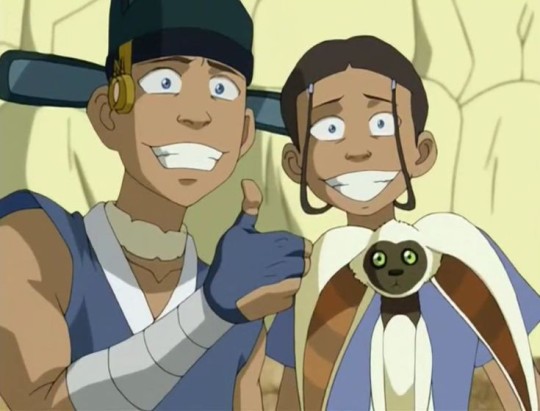
Adios.
#atla#avatar the last airbender#ink rambles#katara#sokka#zuko#azula#azula deserves redemption#katara defence squad
519 notes
·
View notes
Text
After much work i have finally written down my analysis on the fictional character Creek from hit children's movie Trolls 2016, open Read More on your own discretion because this shit is about to get long
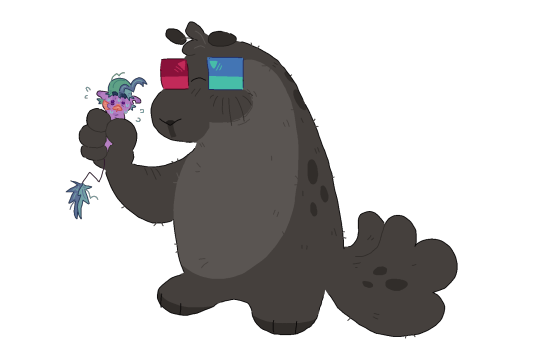
Alright let's start with a small summary for the folks that have never watched a Trolls movie and don't really know anything about Creek outside of the plethora of art i've made about him
Creek is one of the movie's side characters and secondary villain, he is Poppy's (the main character) friend and acts as a short-of twist villain (i'll explain that 'short-of' later,). Although shown to be a stereotypical nature-loving hippie he later betrays his friends and everyone he's ever known as he sells out the location of their village to Bergens, a race who 20 years ago used to keep the pop trolls in a large cage and would eat them once a year during a holiday called Trollstice.
He is first introduced when Branch (the movie's second protagonist) is confronting Poppy about her decision to throw a party, arguing that this could attract the attention of the Bergens, this is also where my first point about Creek's character begins First thing to notice is that, unlike what some people would like you to believe, Creek is NOT the only troll in Poppy's friend group (the Snack Pack) to be dismissive towards Branch, if anything Poppy herself is the only one in the group that seems to want to give him a chance ("i think everyone deserves to be happy"). Creek also shows up late to the conversation, only appearing once Branch escalates the situation by throwing Poppy's party invitation to the floor and stomping on it. You could easily argue that, in Creek's perspective, he is only doing what a good friend should do and protecting his friend from someone who is being cruel towards them, and although Branch has a GOOD reason to be upset and we later find out more about his backstory, there is no reason for us to believe that Creek or even the rest of the Snack Pack know anything about his situation, to THEM Branch is nothing but a party pooper who actively chooses to stay miserable ("some folks just don't want to be happy")
One point that i sometimes see that i would like to snip in the bud as soon as possible is that Creek doesn't truly care about his friends, especially Poppy, and is only using her to get something out of her (what exactly ? well we don't know, we could especulate that since she is the princess, he may want to use her for her status, possibly wanting to become royalty himself, but we're not here for that), the reason i bring this up now is because of the scene that follows the interaction with Branch, where Creek is the first one to notice that Poppy is still upset about the results of the conversation, not only that but he doesn't seem too happy about it himself
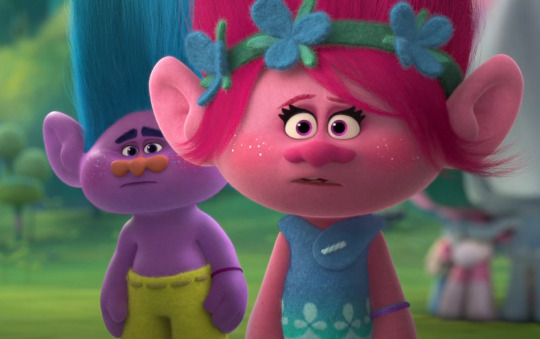
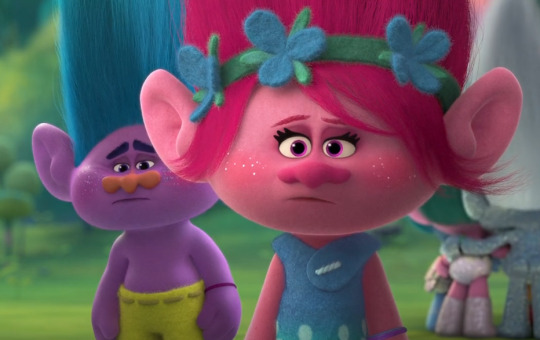
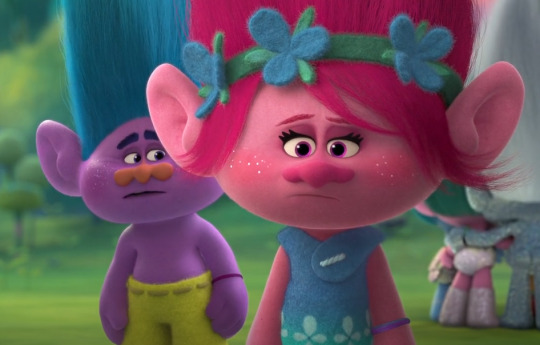
It would have been extremelly easy to animate him smiling or looking smug after Branch storms off, but that doesn't happen, he even glances down at the ground before looking towards Poppy, which is when he attempts to cheer her up. This small scene ALONE already leads me to believe that he truly does care, and although his attempts at cheering her up aren't exactly the best nor the most productive ("tune out his negative vibrations Poppy, they're toxic") he is still trying.
However we do not get enough time to find out more about his relationship with Poppy outside of this very moment as the next scene in the movie is the party and their imminent capture by the Chef Bergen, this is where i'd like to remind you that i called him only a "short-of" twist villain. For a twist villain to truly work we first need to understand why this character is considered to be a "good guy", and their relationship with the protagonist, so that the incoming reveal of them being the antagonist has a impact, not only on the other characters, but the audience themselves. The thing about Creek is that we don't GET that insight into his relationship with Poppy, they interact TWICE before the reveal, and one of those interactions is Poppy attempting to save him from being carried away by a Bergen, therefore the "twist" itself falls flat... but what if i told you that was done on purpose by Dreamworks ?
Before the existence of Creek there was another character who was meant to take his place in the storyline, and her name was Miss Guffin
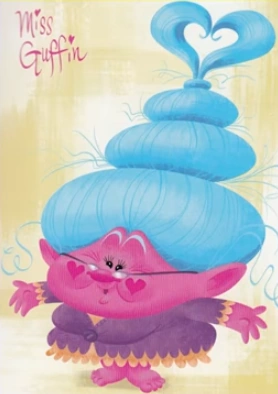
According to concept art, Miss Guffin was originally going to be Poppy's mentor, and be captured by the Chef Bergen, and much like Creek she would sell out the other trolls as an attempt to save herself. Now that would have had a much bigger impact, not only on the audience as they realise that the respectful elderly character was a selfish coward at heart, but for Poppy as she would have had a much closer relationship with Guffin as her mentor. So why was she changed ? It's simple really, she was just too likeable.
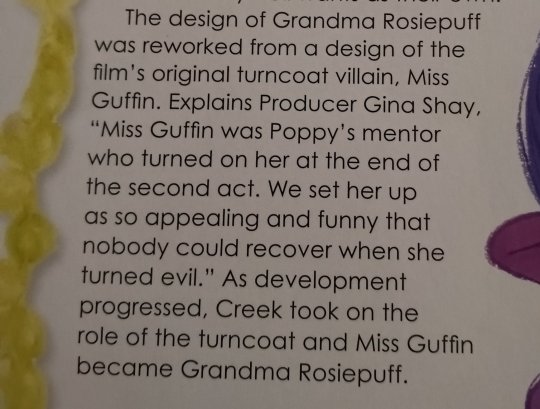
Creek, by design, was created to be unlikeable, not only so that his reveal wouldn't upset the audience, but so that you wouldn't feel pity about his eventual demise. THIS is what i mean when i refer to him as a character "doomed by the narrative", he only exists because a much more appealing character had to be turned down for the sole reason of not upsetting those who watch the movie, he would never have been allowed to have a closer relationship with Poppy, because that would have given the viewer a emotional attachment to him, and we can't have that. Creek is a tragic character in the sense that he was destined to be the traitor, not only a traitor but a unredeemable one, and i understand why that is, there was never going to be enough time in the movie to give him a satisfying redemption, and it would have thrown off the entire flow of the story, killing him off was a much easier choice than trying to squeeze an awkward redemption at the very end, but that doesn't stop me from wishing that there WAS more. His fate feels unfair to me, as his only crime is being kind of a dickhead, and it's hard to blame him for his decision to sell out Pop Village when his only other option wasn't much better, so let's talk about that next.
In the next scene where we see Creek, him and the rest of the Snack Pack have been put in a cage by the Chef, this is where i'd like to point out that his first reaction to this predicament is to try and get everyone else to stay calm ("Woah, woah ! Everyone, we must all remain calm") This scene leads directly to the one where he gets nearly eaten by King Gristle, and when i say nearly i mean it, he is shoved INTO his mouth and assumed dead by everyone except for Poppy, who is only holding out hope that he is still alive. Of course we later find out that he is indeed, not dead, but that is only because he clung to Gristle's uvula causing him to choke and spit him out. The way we find out that he is alive is through Gristle himself, who reveals to Bridget that he has him locked inside his cape's clasp
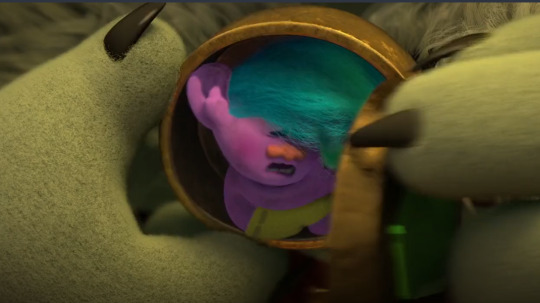
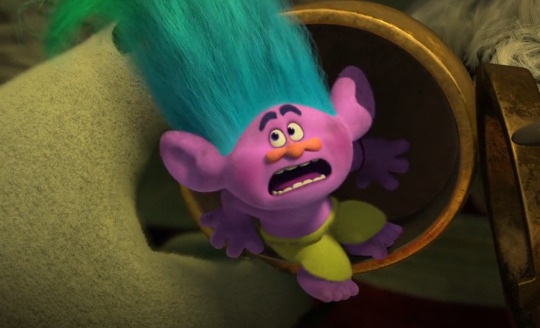
Notice how little space he has in there, i'd say barely any to move let alone breathe, as he lets out a desperate gasp just as the clasp is opened. We do not know how much time has passed since he escaped being nearly eaten alive, but we can estimate it has to have been at least a few hours, as quite a few events happen between the formerly mentioned scene and this one. We do NOT get to see what happens between him, Gristle and the Chef during that time, which means we can only ESPECULATE why he was put in there in the first place, so allow me to do just that:
- Firstly, we do not know if Creek agreed right away to the Chef's request to reveal the location of the village, for all we know he might have declined to do so, and putting him into a small claustrophobic space was a way to give him that final push. - However this could have also been a way to stop him from escaping and telling the other trolls of the Bergen's plan, but i fail to see why they would have had to resort to such a, let's be honest here, barbaric method of keeping him put, when a normal cage would have done the job just as well, perhaps the Chef wanted to make sure he wouldn't change his mind. - Thirdly, this could have been a way to have someone keep an eye on him as the Chef busied herself with other things, essentially making Gristle the guard to Creek's prison No matter what option you decide makes the most sense, one thing is clear: Creek was tortured
At last we finally reach the moment he reveals to Poppy, Branch and the rest of the Snack Pack that he plans on betraying all of them and selling out the location of the village, this is the scene that is supposed to make you despise him, for being so cowardly and selfish that he'd rather let everyone he's ever known die horribly than.... give up his own life ? Hold up did i read that right, oh... hm Creek is a character who finds himself in a situation out of his control and is forced to make a decision between two truly awful options, he can either let himself be eaten or everyone else goes, there is NOT a correct answer here, and in the end his sense of self preservation wins. A decision probably influenced by the fact that before this moment, he had spent hours trapped in a small space with barely enough oxygen. There was NEVER going to be another way, as the Chef states herself:
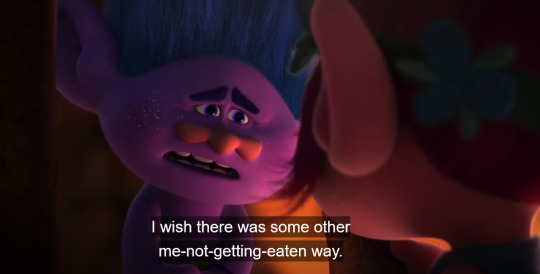
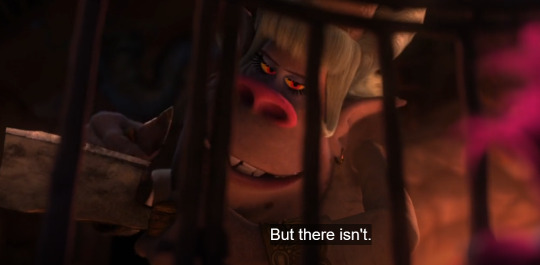
Especially bringing attention to how he acts in this scene, to me it comes across less like he's finally showing his true colors as a manipulative person, and more like he's desperately trying to justify his actions not only to Poppy but to himself ("At least you get to die with a clear conscience")
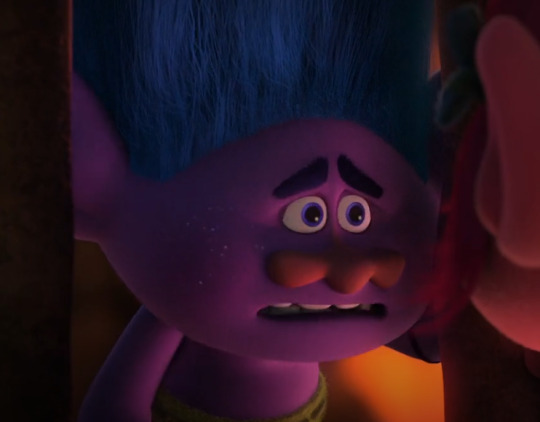
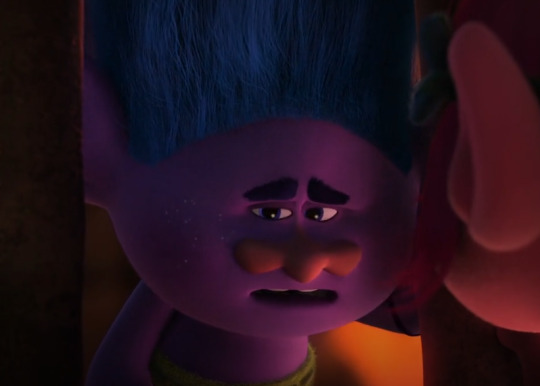
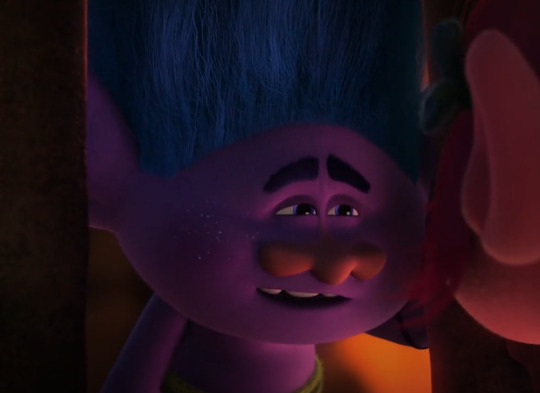
And it seems like he's successful in doing so, for him at least, what other options does he have ? It's either give up your own life, or convince yourself that what you're about to do isn't truly that bad, he chooses to look at it with a positive outlook, ignoring the very obviously bleak reality he finds himself in ("So in a way... You could say... I'm doing this for you")
Another thing about this scene is that we don't really get to see his true feelings on the situation, as during this conversation the Chef Bergen is actively sharpening knifes in the background, even if he did want to come up with a escape plan or air out how he feels about this predicament they find themselves in, he would be unable to do so, as the person who could easily just snatch him up and kill him right then and there stands in the very same room. And that is a recurring thing when it comes to Creek, we don't get to SEE much of him, we don't see the events leading up to his betrayal, we don't really get to see his relationship with Poppy or even the rest of the Snack Pack for that matter, we don't SEE how he feels about being trapped inside Gristle's cape clasp or having to choose between himself or his friends, and honestly we probably never will. For a secondary villain he barely gets any screen time at all, and the screen time he does get is spent in near constant live-threatening danger.
And finally, his story comes to an end, the Bergens discover true happyness, Chef Bergen is defeated, and the last time we see Creek he's getting swallowed up by a mountain sized creature, the very thing he tried so hard to save himself from, to the point that he would give up everyone he's ever loved, happens regardless of his choice, was he even given a choice in the first place ? When both options led him to the same fate ? I would say it's almost tragically poetic if it didn't feel like salt to the wound.
Of course, Trolls: The Beat Goes On exists, but it's not even close to being a good continuation of his character let alone a satisfying redemption, his introduction is incredibly rushed, characters who have no reason to forgive him for his actions immediatelly welcome him back with open arms, and the one person who doesn't do so is shown to be in the wrong even though his reaction and suspicion make complete sense.
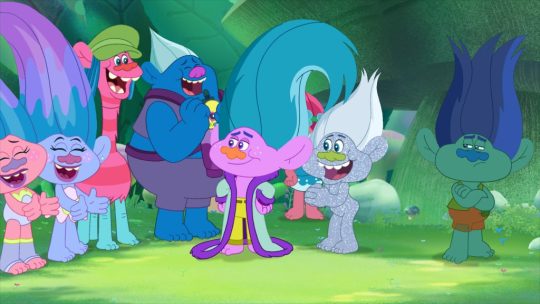
Besides, TBGO is it's own can of worms and opening it now would only make this post longer than it needs to be, so i'll spare you from that.
My final point is that Creek is a much more complex and interesting character than the story would like you to believe, and it CAN be quite frustating seeing people brush him off as just a selfish fraud who never truly cared about anyone but himself when there's really so much more under the surface. Of course i'm not saying that you should love him, hell you don't even need to like him, he has a lot of flaws and has made terrible decisions, but that's also exactly the reason why i am so keen on giving him a better ending. He shouldn't need to be perfect to deserve a nicer fate, to be given an actual choice for once, one that isn't going to blow up in his face in the end, the ability to be better and do better. You don't deserve to be tossed aside just because you have a big ego or some other personal flaw, you don't deserve to be considered unredeemable because you were put in a situation out of your control, making a bad decision shouldn't define your existence for the rest of your life.
I've come to accept that Creek is a very important character to me, he's a character who NEEDS to be selfish for the story to work the way it does, one who's the narrative is actively trying to make as unlikeable as possible at all times, but it's attempts had an opposite effect on me, and the more i dug only solidified him as my favorite in the entire franchise. I love him because of his unused potential, potential that'll most likely never get a true chance to shine due to Dreamworks not seeming to really care about him as a character, so i have taken upon myself to do what canon failed to. If i had to pick ONE THING for folks that read this post to get out of it, is that you should never be embarassed of your enjoyment for a fictional character, no matter how unlikeable or one-dimensional they seem to be, analyse every frame they show up in, write that fanfic, draw that art, create that self indulgent AU, find meaning where no one else did

123 notes
·
View notes
Text
Why the Dragon King Sucks: an Exploration of What Makes a Good Villain and a satisfying Story Conclusion
Dragon Age as a franchise has some of my favourite villains, and also villains I think kinda suck. DATV is not immune to this; Ghilan'nain joins the ranks as one of my favourite villains of the series but there is one villain I can't stand. I get mad just thinking about him. And so I thought I'd share my thoughts.
So firstly, before we can unpack why a villian sucks, we must first unpack what makes a good villain. Contrary to popular belief I don't think a villain needs to be a fully dimensional person to be compelling, but I do think good villains generally fall into one of three categories:
Interesting because of the relationship to the hero/protagonist
Interesting because we understand their point, or because of moral complexity/ambiguity
Interesting because they're scary as all hell
Dragon age has dabbled in all of these types of villians.
The example of a villian who is interesting because of their relationship to the hero/protagonist is Danarius. Danarius is flat out evil with 0 redeeming qualities. His main motivation is to a) experiment on his slaves and b) recapture his favourite escaped slave. We know he regularly tortures and kills people. We don't even meet him until act 3! BUT his relationship to Fenris makes him work. He is everywhere in Fenris's narrative; from the house Fenris lives in, to the actions Fenris takes (he won't even be with you until hes dealt with Danarius), to the feeling that Fenris is being constantly hunted. Danarius is terrifying to Fenris, the things Fenris did FOR Danarius is terrifying to Fenris (killing the Fog Warriors), all of this makes both us AND Fenris angry. When he shows up he's menancing because he's been built up the WHOLE game. He works because of his relationship to Fenris.
Let's move onto a villian who is interesting due to their moral complexity. There were a few to pick from here, but I think ultimately I'm going to go with the Arishock (but shout outs in particular to Calpurnia, Zathrian, Illario and Isseya). The Arishock undoubtedly does some pretty evil stuff, and yet we UNDERSTAND him. He does not want to be in Kirkwall, yet he cannot leave until he gets what he needs. He wants to be peaceful, but is being pushed by the constant way that his people are being agitated; stolen from, blamed, tricked and manipulated by chantry zealots. He doesn't understand why kirkwall is allowed to function as it does when it leads to such misery/pain for everyone. He's very reasonable with a Hawke who is reasonable back and respects them. The thing that tips him over the edge is the fact that he's unwilling to hand over elves that the guards refused to bring justice for, and most people agree that the guards were in the wrong there. Nobody thinks the Arishock should have tried to take over Kirkwall, killing the Viscount and trying to take Isabela. But we UNDERSTAND why he might be doing what he's doing and THAT makes him compelling.
Final category; when a villain is scary. I think writers sometimes confuse this for the villain having a lot of power (*cough* Elganarn *cough*) but that's not what scary is. Scary is usually invoked by feeling that the hero/protagonist is under genuine threat if they were caught or feeling that this person will do fucked up things and has no line; even about people they care about. Absolute main dragon age villian to sit here is Branka who went so mad in her pursuit of the anvil she was willing to let her house be turned into Brood Mothers so they could pump out darkspawn who could test the traps. Ghilan'nain is also in this category.
To make an EXCELLENT villain you probably want to take a few strands from each collum; Loghain stands out here as someone who has a connection to our of our heros (Alistair's revenge quest) but also is morally understandable/interesting.
So now I've laid all that out...tell me. Where does the dragon king fit?
The dragon king doesn't really have a connection to Taash. They want Taashs blood sure but they only make two plays for Taash the whole game and Taash never seems scared of them. We don't find out why or what they want to do to Taash. Taash just. Doesn't know this guy. Like until the very end when he kills their mum, they don't have a reason to hate him.
The dragon king is not morally complex either. He is just. An evil guy working for an evil god who wants power. He's not got a particular point; he's not even like the red templars who at least had the motivation that the chantry had abandoned them and led them to be addicts for no reason. Theres no talk of that being the case with the antam. There is just. Nothing. He's some evil guy.
And finally, he's not scary. He's in fact so un-scary that our protagonists never ever get to fight him because he'd make a shit boss. I think this is a WILD choice. what I think happened was the Devs realised that as the other Taash quests had involved fighting dragons that should be their boss fight but like. What? I literally was so confused when this happened; I wondered if the dragon king could turn into a dragon for a moment or was riding the dragon but it's not that. We kill a dragon and don't even throw so much as a single spell or punch at the dragon king.
AND to make matters worse, we don't meet him until the very end and Taash doesn't really talk about him until then either. Varric narrator style mentions him and that's it. If you're not going to introduce your villian until late in the game you NEED to have build up like what we get for Denarias or Branka or Meredith. That's the whole issue with Corphyeus that everyone bangs on about; he's just not in the narrative enough to carry the feeling that he's an undefeatable big bad.
The dragon king is so boring. There's just. Nothing there. There's no relationship, there's no complexity. Just an evil guy.
And that makes me so annoyed considering that I love Taash and also that the voice acting when Taash's mum dies is so stunning. Taash deserved better than most of the plotlines they got, they deserved a better villian and they deserved choices beyond those that demonised multiculturalism. They don't even need a villain if you do their story right; many dragon age characters have no central villain and are still incredibly interesting: Sera, Blackwall, Vivienne, Cole, Wynne, Bull, Bethany, Carver, Sten to name just a few.
Tblr; the dragon king SUCKS
97 notes
·
View notes
Text
Does Max give anyone else major twist villain vibes???
Okay I haven't talked about Max much yet, but I think it's kinda wild to see people talking about him like he's just this sweet innocent cinnamon roll when my read on his character was the COMPLETE opposite.
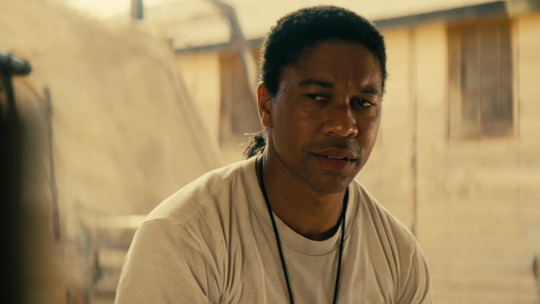
I mean yes, he does seem very sweet. He's very soft spoken. Naive in a way like Lucy, but not as much. Kinda vulnerable. Got a killer smile. And some of the moments with him and Lucy are super cute and adorable. But damn if he doesn't have a DARK side!
Like I've heard people say that Max is stupid or that Aaron Moten's acting is bad, but hell no. Aaron Moten sold me on his acting during the interrogation scene. Max was scared shitless and I FELT that. I think Max was meant to be played as a character who lacks understanding about certain things and seems disconnected from people due to both being brought up in basically a cult and having an inherent lack of empathy.
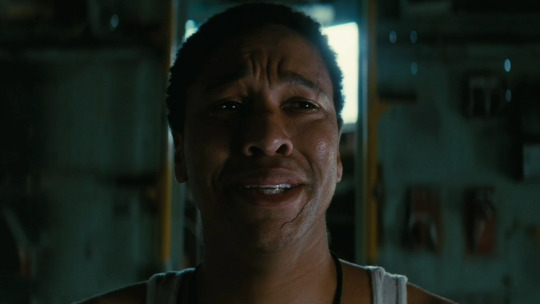
You think about the fact that he admitted he wanted Dane to get hurt, someone who's supposed to be his best friend. How he coldly sat there and watched Titus die. And before that stood there and watched him get mauled by a bear, almost like he was fascinated by it and wanted to see what was gonna happen. The fact that he tried to kill Thaddeus the moment he became a threat, even though the two of them had appeared to have bonded and developed a genuine friendship. And let's not forget he was willing to let all of Vault 4 get plunged into darkness just so he could keep playing with his power armor.
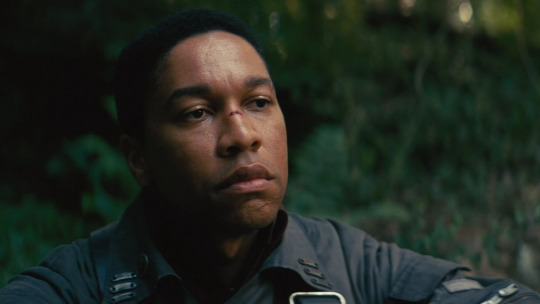
Max wants to be a knight, he wants to be a hero. And I think he tells himself he wants it for the right reasons, but I think what he REALLY wants is power and recognition. Which is really what every (okay maybe not every, but a lot) good villain wants, right? Because at the end of the day Max wants what Max wants. He's selfish, even though he doesn't think he is.
And sure, he's nice to Lucy. And he went balls to the wall to save her when he thought Vault 4 was gonna execute her. But she's a pretty girl who helped him and offered him a safe home. When she gave him the proposition that if she helped him bring back the head, he would have the Brotherhood lend her some knights to save her dad, he KNEW he couldn't make that promise. But he made the deal anyway. So he doesn't REALLY care about her or what she wants.
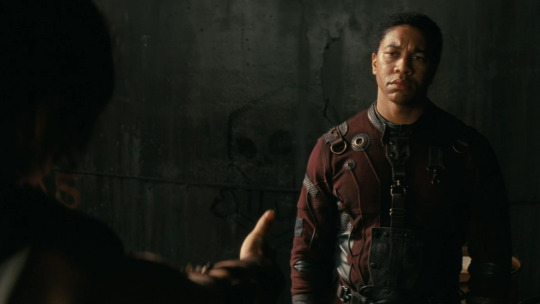
And that blank stare he gets when he gets mad? ACTUALLY terrifying. The guy's got serious psychopath vibes. Literal anti-social personality disorder, if you ask me. In fact the first thing I thought about when Max let Titus die is this kids going to end up going to the dark side lol.
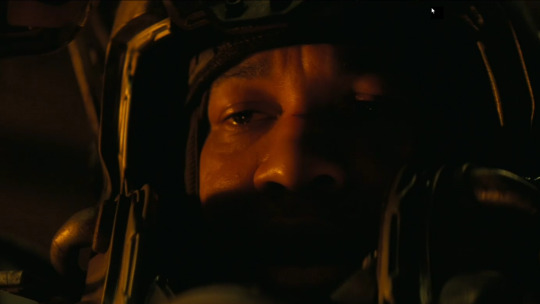
And I think that would work really well thematically if they plan on giving The Ghoul a redemption arc beside it. There are so many parallels between Lucy and The Ghoul, and they have such a strong connection to the beginning when the bombs dropped. I get that Max is there to represent the Brotherhood and he's from Shady Sands, the town Hank destroyed, but it felt weird that he didn't seem to be AS important in the grand scheme of things compared to Cooper and Lucy.
But if Max turned out to be a badass twist villain to thematically contrast Cooper's redemption arc, while Lucy remains steadfast to her commitment to goodness and the golden rule I feel like that would really round it out. It would make sense if you consider a lot of people have pointed out that Lucy, Cooper and Max all seem to represent different play styles and different moral alignments. And I think it'd be pretty crazy if the writers of the show set out to make it seem like Ghoul is a bad guy and Max is a good guy, but then it ended up being the opposite.
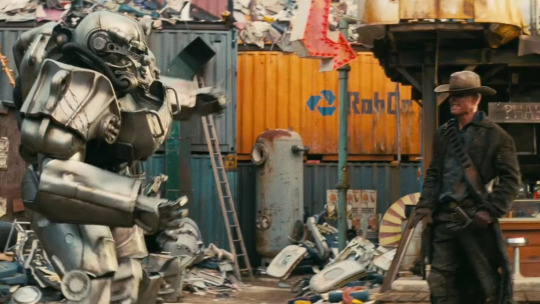
I mean, there are definitely hints all over the show that The Ghoul isn't as bad as he may seem. And Max has already done some pretty messed up stuff, so I'd say the possibility is totally there, and I'd be here for it!
Who's with me???
#seriously why is no one talking about this??#is no one else seeing what i'm seeing??#is it just me or am i crazy??#also Max really doesn't get enough love tbh#rooting for twist villain Max over here haha#maximus#fallout#maximus fallout#fallout maximus#cooper howard#lucy maclean#fallout prime#fallout tv series#fallout series#the ghoul#fallout show#aaron moten#my posts#meta#ghouly-boi
264 notes
·
View notes
Text
“Every time I talk to people, they talk about the economy. But I'm like, man, since World War II, the economy has always done better under a Democrat president. That's just a fact.
It's always been Democrats. There's been 11 recessions in this country. Ten of them have been Republicans.
So I don't know how they've hijacked that narrative. But I think the other thing that you just got to chock it up to is just good old fashioned racism. And I think in the case of Vice President Kamala Harris and Hillary Clinton 2016, sexism.
I just really do, like it's still America at the end of the day. There are people in this country who are still just holding on to old ideologies. They don't want to see America be a great American melting pot where all of these different people from all of these different walks of life can live.
They like that racist, sexist, bigoted rhetoric that Trump spews.
Why is it so hard for her to say that?
I think because for whatever reason, like, you know, you hate these elected officials even when you say, is America a racist country? OK, you can't say America is a racist country, but you can say that, you know, there's systemic racism in America. I think that is a fair thing to say.
Like, I watched her on Fox News the other night, and I loved how she handled Bret Baer. When Bret Baer tried to push her, Bret Baer was like, are you saying the American people are stupid? I can't remember how he worded it, but she was like, ‘No, I would never say that because I don't want to disparage the American people. But my opponent has no problem doing that.’
And I understand that approach, you know, but I think that it is perfectly fine to acknowledge that those things exist because guess what? As a Black man, as a Black woman, you feel that.
As a woman, you feel that sexism. As a Jewish person, you think you don't feel all the antisemitism that's happening right here in our country. Like as a gay person, you think you don't feel the homophobia.
So you can speak to what people are feeling because you see it.”
There was an amazing moment in the interview where someone comes along and brings up the F word, fascism.
Kamala Harris: It's two very different visions for our nation. One mind that is about taking us forward and progress and investing the American people, investing in their ambitions, dealing with their challenges. And the other, Donald Trump, is about taking us backward
Charlamagne: The other is about fascism. Why can't we just say it?
Kamala Harris: Yes, we can say that.
Tell me about what transpired there and how you felt about it.
“Well, it was the same thing that we just said, right? Like, you know, she was saying what she's about, and then she was saying what he's about.
And I was just like, yo, just say it.
Like, he's a fascist. You just had General Mark Milley just said he's a fascist to the core, like a danger to the country. So for me, it's like the American people will never understand the threat that Donald Trump is if people aren't spelling it out.
They didn't treat him like he's a threat to democracy. They kept saying that he's a threat democracy. They kept saying that he's a threat to democracy, but Merrick Garland should have locked Trump up after the coup. Right?
I was literally watching something yesterday and there was a person talking and the person was like, if Donald Trump, you know, really let an attempted coup of this country, why didn't they arrest him? They did. They did charge him.
But there's so many people who don't even know because he's not treated like that. We know we live in a society that knows how to demonize people when they want to. Right?
You can look at it, and I'm just going to use this as an example. Not saying that it's not warranted that it's happening, but look at somebody like Diddy. Front page of every newspaper, all over the news.
You hear about every charge. Like you see it, you see it, you see it over and over. They don't villainize and demonize Trump in that way.
You've never seen Trump in handcuffs. You saw one Trump mugshot. Like they don't treat it like.
The media has continuously treated Donald Trump and his whole candidacy like it's normal, which is mind boggling to me.”
What do we have to... Not to be defensive, but jumping up and down, what do we have to do? I mean, how many different ways can you say it?
“You know why it doesn't penetrate? Because Americans are spoiled and we don't think it can happen here because it's never happened here.
Like if you talk to older people who were closer to that, who can remember things like, ‘Oh my God, he's doing a rally at Madison Square Garden.’
That's what happened in the 30s with the Nazis.
If you can talk to people who understand that, they get it. This generation doesn’t.
If you have a sense of history and you've read things like The Fall of The Third Reich, things like that, you can see the patterns that lead to somebody like Trump becoming a dictator. I just don't think people think dictatorship is possible in America, but it is, because our democracy is very fragile.”
—Charlamagne tha God, on election 2024
#politics#charlamagne tha god#election 2024#kamala harris#donald trump#fascism#racism#leonard mckelvey#white supremacy#white nationalism#the breakfast club#democracy#fragile democracy
135 notes
·
View notes
Text
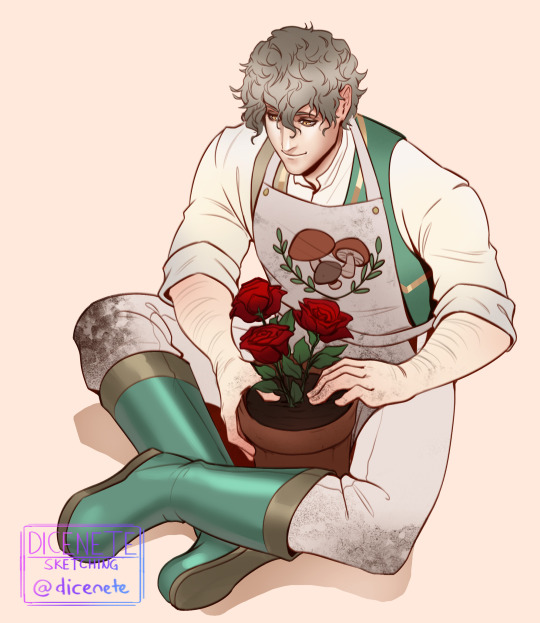
I repainted his face more times than probably necessary but something always caught my eye and still does, but it is done. is done. It's fine. xD IkePri Tagteam:
@scummy-writes @goustmilk @solacedeer @m-mmiy @mxrmaid-poet
@pawnkyyy @ludivineikewolf @violettduchess @floydsteeth @wistfulwanderingone
@sh0jun @lorei-writes
A little bit of rambling of him below the break, spoilers (Keith's route, and little bit of Nokto's route) and such :0 so you have been warned.
TL;DR: I enjoyed the route despite its questionable elements. MC is too forgiving at times, but other than that, romanctic route was cute. Licht, the third wheel, was funny but sad.
Okay first about Keith's visual design: I really love how his design is the most asymmetrical from the suitors. Like the jacket and the vest he has. The jacket is very interestingly layered, almost like you aren't sure which part is the main thing and what is the accent. The green or the gold? The host or the alter? : D Same with his vest. His duality is battling in his clothing too hahaha
Keith's route was interesting. I had heard lots of differing opinions about it and I had my own reservations.
One mainly about the portrayal of DID and how the route does it. First things first: I'm not an expert at all. I won't even humor the idea that I had any say in anything regarding it. But overall, it could have been worse? Of course it might be very extreme in the way Alter Keith is hostile towards Host Keith. And of course you shouldn't take this as the only way the alter systems work. But as I said: I'm not an expert.
I had heard that the dramatic route follows Alter Keith and romantic route host Keith. I picked the romantic one. I had my personal reasons for that tho. But aside from that, it was nice to be with Keith that who struggled with self-worth. It was nice to see him grow as a character and find that strength to stand up for himself. (The fact that the host Keith seems to think that he is inferior to Alter Keith and that people would prefer the alter over him. The amount of stress that will bring. )
Keith's uncle was your very generic villain/antagonist without any real depth. He was a spoiled noble and so on. But since this was more about Keith inner journey I thought it was fine that it was like that.
The drugging scene… Well. That's a… a topic. Hmm… Host Keith himself felt very guilty about it and was full of remorse. Not that it was his choice to do it. Alter Keith well… He might justify it because he was gathering information about a rumor that might endanger his home country and people if it were true. I kinda can see where he is coming from, but also...IT CERTAINLY WAS DESTROYING OF TRUST. Like that time when Nokto "accidently" gets MC drunk. but hey ho. Since there is limited time frame for the chapters, I do understand they can't really jam all the things there, but I wanted Belle be more angry with him with Alter Keith for longer.
Maybe that's what bugs me sometimes. That Belle/Emma/MC is sometimes too forgiving and too much of a doormat. It works in routes like Yves and Licht (from the routes I have played, Leon seems like the most respectable gentleman too), because they are not being insulting towards her. I would even think that she works with Clavis, tho I would love to see him with someone who shares his chaotic gremlin energy. But with characters like Chev, Silvio or Alter Keith the their "power" doesn't feel balanced. MC seems to be completely on their mercy even if they stand up to them in some way. (Gilbert is another can of nasty things.)(With Chev's route, well, that is also a rambling for another time. But I haven't finished his route yet. so I will keep my ramblings to myself for now.)
Is Keith's route more about acceptance then? Accepting the good and the bad of a person? Possibly. I would think that is a good way to put it. Both Keiths have good and bad sides. And it seems that they are working on them.
193 notes
·
View notes
Note
so my friend, at 12 am, called me just to say that dick grayson is the only one in his family that bruce truly views as an equal and then hung up. what. what do i do.
well, call them back and tell 'em they're right 😂😂😂
I started cackling so hard I began wheezinggg oh my god that's hilarious!!!
But maybe for a more reasonable time to talk about this concept after you wake/have woken up from your dick grayson cameo dreams, I'll drop some comic panels
Dick is privy to all of Bruce because of the way Bruce treats him like an equal

He lets Dick in on secrets that he doesn't tell any of the others
I've made a post before on how Clark views Dick as his equal just as Bruce views Dick as his equal.
I'm going to drop the Bruce segment here:
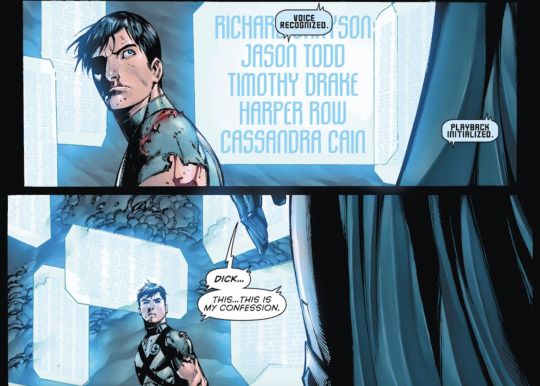
When Bruce was gone the only person he entrusted any information to was Dick. He left a personalized - voice activated - message for Dick and only him that lists his worries, faults, and regrets.
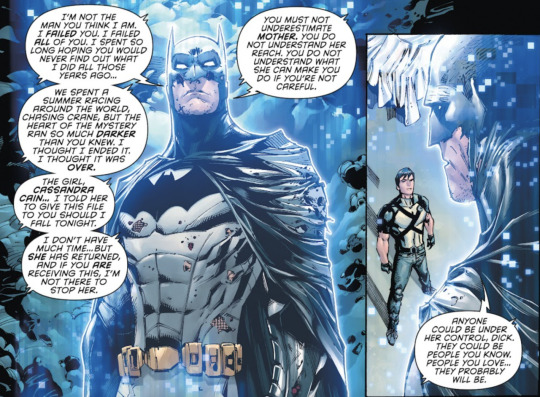
"The girl, Cassandra Cain... I told her to give this file to you should I fall tonight."
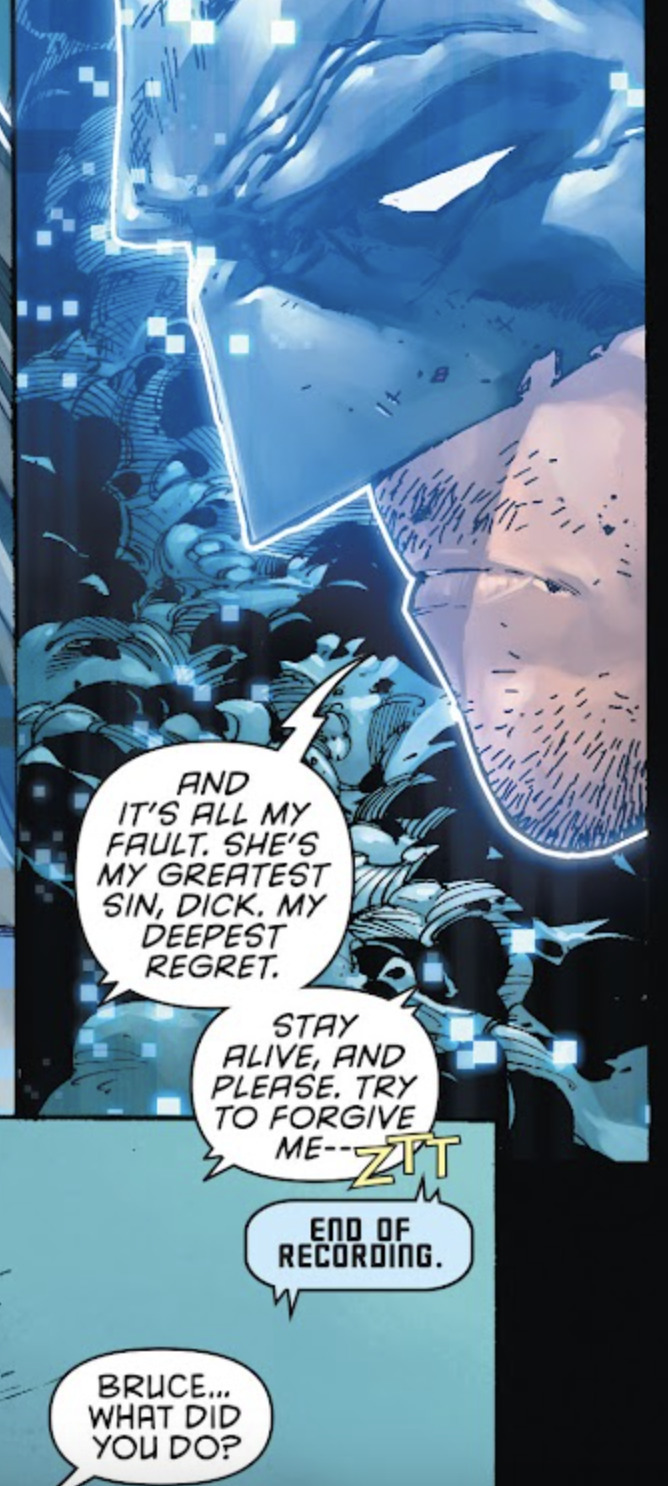
"She's my greatest sin, Dick. My deepest regret. Stay alive, and please. Try to forgive me--"
He lists his insecurities to Dick as friend, as an equal.
Of everyone Bruce left behind, the only person Bruce left a message for was Dick. He relies on him unconditionally to take over because Bruce doesn't seem him as a kid like he does with the other - don't get me wrong, he still values and knows just how brilliant the rest of his children are - but he sees Dick as an equal in terms of intelligence, abilities, and leadership. Actually -
Bruce puts Dick on a pedestal.
He views Dick as the golden standard of everything he's working toward.

The reason I think Bruce is so harsh on Dick in regards to training is he doesn't see him as a kid that needs protection, he seems him equal to himself.
Time and time again he sends Dick on solo missions because of the faith he has in Dick's abilities and intelligence

In another comic there's an Arkham breakout and Bruce just. He just sends sends Dick on a solo mission to contain the entirety of Arkham and the villains inside by himself.
And Dick does. Effortlessly.
The fight for Spyral

"I know the other heroes. I know them all. I'd have them do it, but they can't. They'd fight, but eventually they'd give up, they'd give in."
We all know that Bruce despises himself when he fails at something. He thinks he's the best in the world and struggles to cope with the idea that he failed. As such, Bruce views Dick as an extension of himself. Unlike with the kids where he acknowledges their differences and treats them like children, Dick and Bruce are so intertwined that Bruce considers Dick as the "good part" of himself while Bruce is the "bad part".
He gets the angriest at Dick during times where Dick disagrees with him because he believes that Dick should understood what he's going through and what he believes in. For his part, Dick is always on Bruce's side and acts like Bruce's leash. He'll let Bruce do anything he wants as long as it's within the limits of acceptable behavior. Once Batman crosses those limits, Dick fights with him to bring him back.
As such, Bruce doesn't differentiate himself with Dick. He is the best and as a result so is Dick. Except in his mind Dick is better than him in every way possible and he took the steps to ensure it through training.
One of the reasons people in the comics call Dick the Golden Child is because he's the living embodiment of everything Bruce strived to create. It's not because he follows his orders religiously or anything. No, Dick just gives Bruce a longer leash than most.
In the Spyral fight I think he hits Dick because he is in part frustrated with himself. Imagine seeing someone you have unconditional faith in because you know they're capable of the very same things as you and can even surpass you fall to a threat. Doesn't that mean you would've fallen too? Is their failure just as much yours if you see yourself as a god? But how can a god-like being fall?
Their relationship is complicated because while Bruce sees Dick as his own person, he also sees him as the reflection of his success.
That's why Bruce is harsher on Dick than the rest of the kids. That's why Bruce makes Dick his right hand man. That's why Bruce shares his sorrows, fears, and vulnerabilities to Dick.
The way they interact, they view each other as father and son but with all the roles and responsibilities as partners.
Dick's compartmentalization and the way he mothers Bruce and Bruce allows it? He doesn't let anyone do that. I feel like on some level he subconsciously expects Dick to take care of him. As someone he can turn to with his worst and darkest sides and still be loved and appreciated and told everything will be alright. It's not a burden he places on the rest of his kids. Which is why Dick's relationship with Bruce straddles the line between son and guardian with him playing both roles and Bruce reacting/ forcing him to react that way.
Also

"Robin fuctions as support."
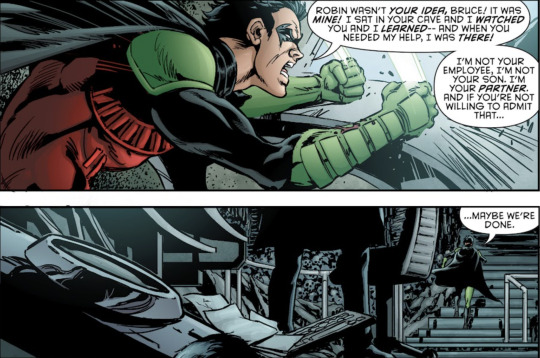
"Robin wasn't your idea, Bruce! It was mine! I sat in your cave and I watched you and I learned-- and when you needed my help I was there!"
"I'm not your employee, I'm not your son. I'm your partner."
One thing that differentiates Dick's robin from the other robins is that while the other Robins were worried about meeting Bruce's expectation, Dick was more worried about Bruce not seeing him as an equal. He ran away from home because he was mad that Bruce was becoming more controlling and not at all like how they used to be - partners.

There's a reason Dick is the only one Bruce views as his equal. It's because the experiences they've shared have woven them so tightly together that Bruce considers Dick his better half and pillar of strength. If he falls back, he can rely on Dick to take over. Emotionally and physically.
Still laughing at your friend lol. Wild
539 notes
·
View notes
Text
thought about them again. sorry. it will keep happening

dont read the nccts then rewatch season one and go back to the nccts. worst mistake i ever made. So anyway let me pepe silvia at you about crimtoinette i have an essay prepared-
wasnt joking. If it were up to me this wouldnt be a link itd be a long post on here but the drafts function is not cooperating with me <3
Various stuff i drew while this analysis was in the making:





#rewatched the 'your parent is dying' cutscene and thought about it with ncct context and man. man#dani's insane line kinda steals the show but crimson's side of the conversation is kind of fascinating in retrospect#specifically the way its delivered and the words used... especially when placed in context...#hes like. frustrated but not angry With Her. and says 'well i guess i lost the tournament. oh well. whatcha gonna do. but uh...'#he brings up how prisms been hanging around her a lot lately. and says 'if i know my babysitter...'#he sorta stops and starts again a few times like hes trying to figure out how he wants to word it. like hes being careful.#he says 'has she said anything to you?' and the context has set us up to assume he means about him. and then Dani. oddly shaken by this.#drops the line about the cods' parent before we cut back to just before their fight. when Prism did the arm thing.#after the nccts? where the first thing he does when he gets the opportunity in a noncanonical space is to warn her about prism?#theres a part of me that thinks. Did He Want To Ask Her If She's Okay.#but didnt think he could Get Away With It Directly when in a canonical space where it would Actually Matter.#*assume he means about him but leaving the question very vague and open#tfw youre an evil villain and you made a mortal friend but unfortunately shes A Good Person so she stabbed you in the back#so your feelings get kinda tangled about it because you like her genuinely as a person but also Y'know. y'know.#but then your abuser starts trying to encroach on HER life when you don't want Anybody to have to deal with her#LET ALONE your old ex-friend-ish you have no hard feelings toward because youre a bad guy and Deserved It.#so even though you know she hates you and the friendship was never real on her end (or so you have to assume) you cant just.#not say anything.#and you dont normally like to risk being too honest about The Nature Of The Untold Horrors#but despite yourself you are honest to god Worried For Her. man.#he says its good to see her again................................#i also think its funny how the nccts treat his 'treachery' title as effectively meaning hes a god of deception#but like. deception is the method by which every major villain. including crimson. has ultimately been defeated.#technically even p. rool was a case of deceptive appearances. framed as a bad guy when he just wanted to get what he worked for#and then snapping in frustration and lashing out as he was consistently kept from getting it for arbitrary reasons#when heroes face villains straightforwardly its almost accidentally framed as morally sound. but a flawed approach.#they tend to do their damnedest but ultimately fail. and then someone who was ready to play dirtier pulls up and seals the deal#the message sent: 'when the enemy has all the power and the game is rigged... the only real way to win? cheat your gay little heart out'#theres some phrasing choices id tweak in these tags if editing tags without deleting them were possible <3#you get the point im sure
13 notes
·
View notes
Text
da2's arishok is a good villain. if you have a fundamental understanding of the qun and listen to his thought process, the things he does makes sense. he uses the qun to justify slaughtering kirkwall's people, which is utterly inexcusable and what makes him a villain, but his character is complex enough to make dealing with him that much more thought provoking. he sends agents to kill petrice because she was killing his people, he doesn't give up the elves because they committed their lives to the qun, no matter how recently they converted, and he refuses to leave without the tome (and isabela) because his idea of justice hasn't been done. his logic makes sense, generally, though it is wrong on more than one occasion. he isn't moral, but he is methodical.
i feel this way about solas, too. i like da2's arishok for the same reasons that initially draw people to solas, i think. when we meet them, i find them interesting and educational to talk to, someone worthy of respect, and someone very honorable in their own way. similarly, many of my issues with solas compare with flaws in the qun/the arishok.
solas asserts that all of his beliefs are correct, and we're never allowed to challenge him on any of it. if he has high enough approval, he'll approach you to go, "yknow, i thought you were all [insert prejudice or stereotype] but YOU showed me that some of you guys are actually okay," which is NOT what it looks like for someone's beliefs to be challenged.
brief aside, i want to be fair in that we don't get this opportunity with many of the companions, and it's not even an inquisition specific issue. the dialogue format is agree, joke, be mean, and it's flawed, but it works in the majority of interactions. we don't really get to engage in nuanced discussions with characters, but there are positives and negatives to the system overall. it is possible to challenge and shape a character within this dialogue system (i.e., garrus vakarian) but in dragon age that really only comes in the form of harden/unharden. it was a little more doable with origins' system, but it really hasn't been a huge part of any dragon age game. most characters' beliefs remain largely unchanged by you regardless of how you play.
solas also possesses a strong sense of duty and purpose, though what duty he has, what his true goals are, he keeps hidden as long as he can. the most damning comparison though, to me, is how willing he is to destroy the world and bring back "his people," while the qunari fight to conquer the world and homogenize society into "their people."
in any case, with both him and the arishok, you can see the wheels turning in their heads. you can see why they do what they do, even if it's wholly immoral. it makes their threat a lot more personal, a lot scarier, psychologically, that a "normal" person, who doesn't want to cause suffering, can hold such specific beliefs and such strong conviction that knowing that they'll hurt people doesn't give them any pause. the root of their motivation is understandable. solas wants to right his wrongs, at his core. the arishok implicitly believes that the qun is safer, better for its people than life outside the qun. we can see that they're taking it too far, but they don't care. it makes them good villains.
"i am not corypheus, i take no joy in this." sure, which is a very similar sentiment, emotionally, to the qunari sense of duty. you can say you don't enjoy it all you want, you're still committing genocide. you can hate the qunari all you want, but you fight with their ferocity, their unshakeable faith in their own cause. their need to "do what's right," no matter who's caught in the wake.
i understand why people like solas, i go back and forth on it myself, but i don't think he's all that different from the arishok in method and motivation. they're each thrust into a world so different from what they believe is "right" that they demand it change around them. if we had to kill the old arishok, then if solas refuses to give up, he will have to die. he doesn't get to do genocide just because he's romanceable. he's a good character, he's a good villain, but he's not a good guy, and unless he stops before he does any real harm (which he will not do), he should share the arishok's fate.
#ive had a hard time trying to put words to the way i feel about solas#but this does it#solas is a good character and quite likeable for lots of reasons#especially in inquisition's main story#but end of the day hes not a good fuckin dude#also please engage with this it took me like three hours#da discourse#cw: genocide#dragon age#dragon age 2#dragon age inquisition#da2#dai#the arishok#solas#fen'harel
476 notes
·
View notes
Text
I just came up with a hc that makes the sequel trilogy 200x funnier.
What if Rey and Finn are both students at Luke's academy and the whole sequel trilogy is just Rey, age 8, making up a crazy wild fantastic adventure story to tell to her bestie Finn, age 9, while they're being watched by Poe, age 12, (who is visiting the Jedi academy because his mom is friends with Leia) and Ben, age 11?
Hear me out.
ST!Rey is a desert orphan because lil Rey WAS a desert orphan before Luke found her. The reason Rey learns to be a Jedi so quickly in the ST is because lil Rey is telling a cool story about herself!
Finn is a stormtrooper, because once he met Captain Rex and thought he was really cool and he wants to have white armor too, so Rey makes him a Stormtrooper who turns good and rescues Poe.
Poe jumps in on Rey's story at the beginning to wax poetic about himself being the best pilot in the galaxy, and Rey tries to one-up him by making her story-self fly the Milennium Falcon through a star destroyer.
Ben keeps hijaking her story to try to kill off everyone so he can leave, so he's obviously the villain. Rey keeps trying to make him have a redemption arc to no avail. At the very end he just gives up, says "okay FINE i turn GOOD and help you save the day BUT THEN I DIE", and he leaves.
Luke is a grumpy island hermit in the ST because lil Rey is annoyed with him because he wouldn't teach her to try to float an X-wing (something totally out of her skill level) and so she's like "and then i went to the ISLAND and met LUKE and he wouldn't teach me AAAAANYTHING!"
Poe makes up the scene where Han gets stabbed because when Ben was 2 he accidentally stabbed his dad with a fork and Poe thinks it's hilarious to keep bringing it up.
Rose is a friend of theirs who visits for just long enough to get Rey to throw a gratuitous space-horse subplot into the plot of TLJ cause Rose is a space-horse-girl, but then she has to leave so Rey writes her out of the plot of TRoS.
Anything else that doesn't make sense about the ST is just because it's a story told by an 8 year old girl who's here for a good time and doesn't really care if it's realistic, because it's fun and that's more important.
#and to be clear? I do enjoy the ST!#this is just all in good fun. Not to hate on it at all.#star wars sequel trilogy
381 notes
·
View notes
Text
Lily Orchard is stupid but what else is new?
So recently Lily has made a challenge that is as follows:

(Keep these rules in mind)
And AntGr and CrimsonEnder made a list of 50 of those charcters. Which Lily responded to and hoo boy is it bad.
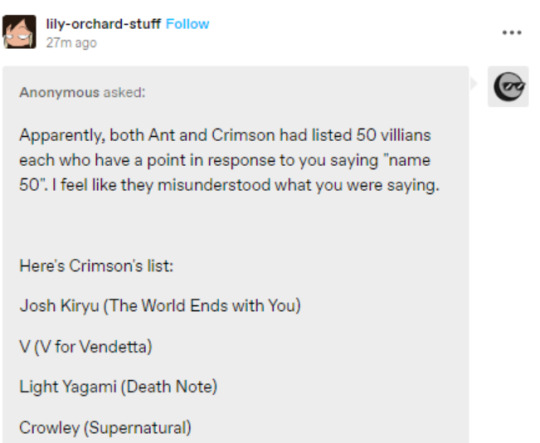
Now I'm only going to be doing several characters from this list because 1. I don't know some of these characters and 2. I can only handle so much of Lily's stupidity. So with that out of the way let's get this show on the road.

Of course you'd put N here because you didn't understand his story to begin with. N definitely does fall under number 2 because he was raised by Ghetsis. You know... THE LEADER OF TEAM PLASMA! I've said this before, but I'll say it again N essentially grew up in a cult. That's not even mentioning that in black and white 2 they show that some of Team Plasma really did think they were freeing pokemon. You see part of Team Plasma split because some followed N's ideologies and others followed Ghetsis. They have a whole safehouse in Driftveil City where they protect pokemon separated from their trainers. But yeah N's ideology was totally swept under the rug guys.

First of all, Donkey Kong was actually a villain. It was in his very first game where he kidnapped Pauleen. You know.... this one. You were probably around when it came out Lily.:
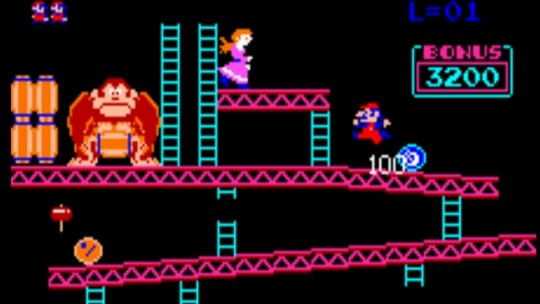
So technically Donkey Kong is qualified for this list believe it or not.
As for Dedede and Meta Knight their case is quite simple.
In Dedede's case in the game Kirby's Nightmare In Dreamland. Dedede literally breaks the Star Rod that powers the Fountain of Dreams. Which allows the people of dreamland to have dreams, but since the Star Rod no longer powers it there's no dreams. However Dedede did this because he was trying to keep Nightmare from absorbing the Fountain Of Dream's power and taking over the world. Nightmare is cosmic deity that's evil will destroy Dreamland if he got out. So in that instance Dedede does have a point. After all if the Star Rod isn't in the fountain then Nightmare won't come out and kill everyone.
As for Meta Knight's case. Well... just look at fucking Meta Knightmare. The reason why Meta Knight wants to conquer Dreamland is because Dreamland is lazy. While that might not seem like a good point, consider that Dedede is stealing food from the people and how there's some sort of cosmic threat every year or so. You kinda start to see his point a little bit. But if that doesn't work then how about in Squeak Squad where he steals the chest from Kirby and Daroach. The chest had Dark Nebula inside of it and was sealed away. Therefore having someone try and open it would be a big fucking problem.
Last but not least... Edgeworth:

Before we get into why this point is bullshit I'd like to bring up this ask:
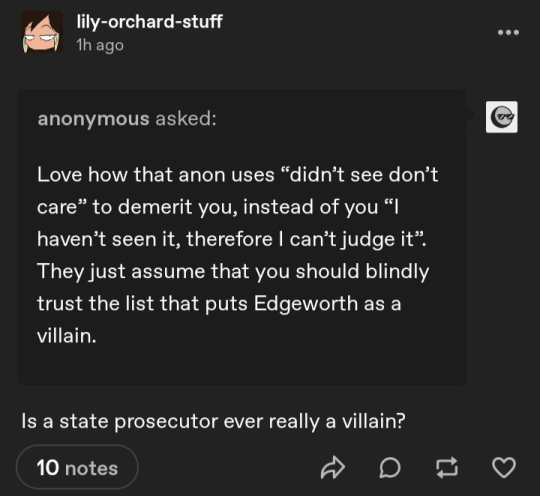
I bring this up because it proves that Lily doesn't know what the fuck she's talking about. You see Edgeworth isn't just a state prosecutor. HE'S A CHIEF PROSECUTOR! He's not just some joe shmo. Also really, prosecutor can't be evil? May I call Manfred Von Karma to the stand:
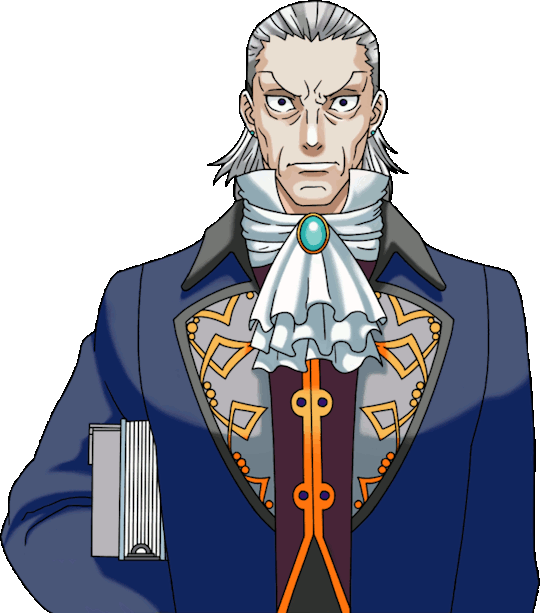
In case you don't know. This man is a prosecutor that had a perfect record. All of his defendants were served the guilty sentence. However the only reason why they were found guilty was because he forged evidence. Meaning Manfred is responsible for putting people innocent in prison. He even went so far as to murder Edgeworth's father. And guess who was his protege?
That's right none other than Miles Edgeworth himself!
Meaning that up till Phoenix had arrived Edgeworth was doing the exact same thing Von Karma did. Granted not forging evidence, but still putting innocent people in jail because of he wanted to keep his reputation and he didn't care for justice. Therefore in the first game Edgeworth was the villain. Whether you like it or not. And because Lily never specified that the villain had to be redeemed or not Edgeworth is viable enough to be on this list. So check fucking mate Lily.
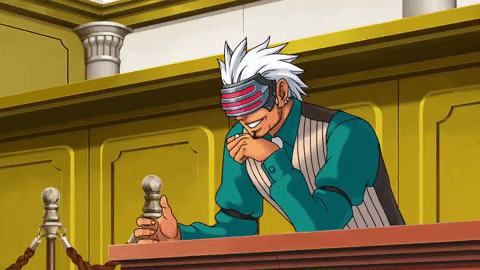
#lily orchard#anti lily orchard#lily peet#lilyorchard#fuck lily orchard#I was rping a bit there#i apologize#i was playing ace attorney music#lily is a moron#lily orchard is garbage and here's why
66 notes
·
View notes
Text
The eternal opposing relationship between the two sides of a mirror
or: In defense of Shiori

I feel like Shiori is one of the most controversial characters in Utena. Some love her, others despise her. And I don't have a problem with people having strong opinions on her character. What bothers me is the tendency to exaggerate her most negative traits, focus on her most harmful actions, completely ignore any redeeming qualities she might have and then paint her as a one dimensional villainous caricature, a mean straight girl who plays with the lesbian's feelings for the sake of it, without anything deeper going on.
I'm aware of the fact that some people refer to her like that in endearment or in a satirical fashion, and I'm not saying that you can't consider her your favorite problematic evil girl representation. I'm only trying to make people realize that it's her complexity that actually makes her such a compelling character.
I've seen people call Shiori all sorts of names, some of which were baffling enough to make me wonder if they even remembered what happens in the show, and weren't just judging a version of the character that they made up in their head.
So, let's look at the things Shiori actually does, throughout the course of the story.
Disclaimer: I'm only going to take the series into the account here, because I think we can all agree that everyone's characterization and personality differs at least slightly in the movie. Background characters also get a lot less screen time to explain their motivations in order to fully focus on Anthy's journey and struggles, which is understandable.
1. She "steals" the boy from Juri.
This is her biggest crime, which seems to define her from the very beginning. Even though Juri didn't actually have any romantic feelings for him, this action is detrimental to their relationship - it breaks the trio apart, isolates Juri from the pair, is an act of betrayal against her and proves it was done with full awareness that it would hurt Juri emotionally.
Shiori is a deeply insecure person, who constantly feels inadequate and beneath other people. The only reason why Juri seemed to actually like her that Shiori could think of was pity, and even when she found out she was the object of her romantic affection all along, she still struggled to comprehend it. Her self loathing and constant perceived inferiority make her desperate to gain any sort of control over her life and relationships, but they're also the exact reason she feels that the only way she could ever do that is by hurting others. She's always one step below and incapable of crossing that distance, therefore the only way to become equal to people is to bring them down to her level, by humiliation.
When she "steals" the boy from Juri, she achieves that. For a moment, she feels good about herself and leaves Ohtori thinking that she has found the answer, the solution. But she's wrong. From that moment on, it becomes more and more apparent to her that what she did was never out of love for the boy, even though she doesn't let herself acknowledge it fully. Because the truth is, Shiori actually regrets hurting Juri, which she admits herself during her elevator confession.
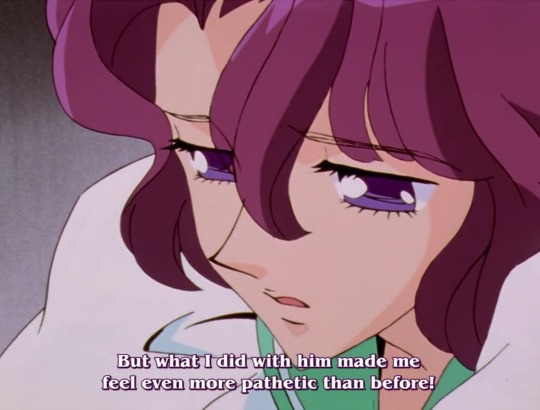
When the guilt starts getting to her, her confidence high wears off, and she ends up feeling ever worse.
That's why she breaks up with him and comes back. She's not ready to leave yet, not ready to progress. There's still something binding her to Ohtori - Juri, and Shiori's unresolved feelings for her.
2. She tries to set things right with Juri and to fix their relationship.
Even though at this point Shiori still thinks that Juri only ever associated herself with her out of pity, she still makes several attempts to get closer to Juri, who understandably (albeit coldly) turns her down ever time. This is a very clear sign of conflicting feelings Shiori has for Juri - jealousy and admiration, resentment and longing, hate and love. After all, Shiori admits that the two practically grew up together. Their friendship may have always felt fake to Shiori, but she clearly cherished it deeply.
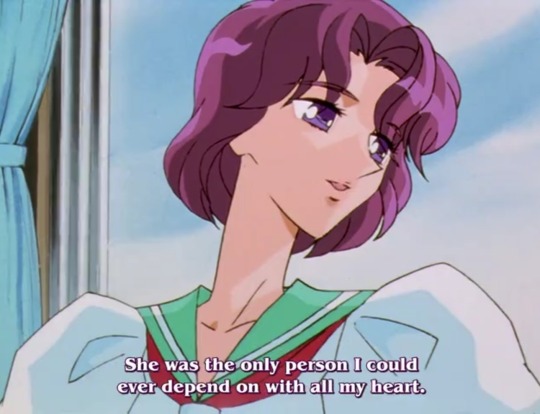
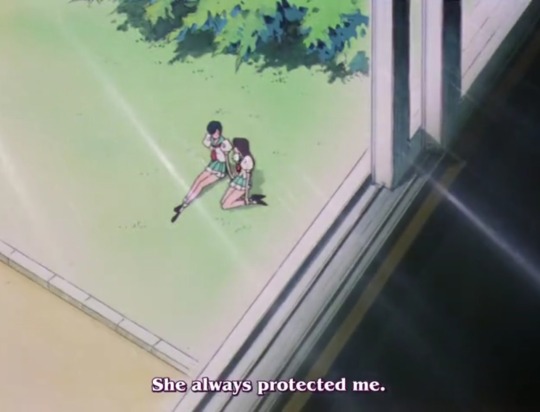
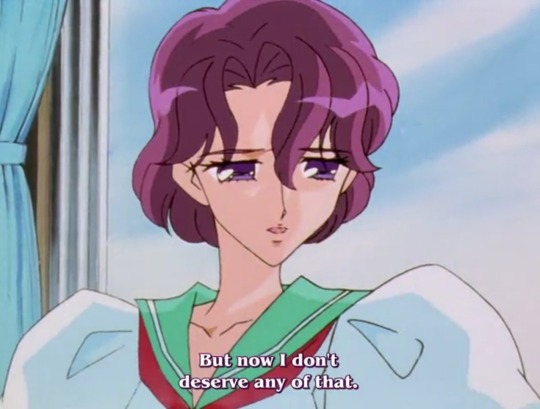
3. The Black Rose Arc.
First of all, we should establish what is the purpose of this arc and how it functions. It explores the motivations of background characters and shows their worst side to the audience. The characters that end up in the elevator are the most unstable, vulnerable ones, with the least power in the system, in unequal and/or exploitive relationships with the duelists and their agency under threat. Mikage offers them a way to gain that power by making them follow their most toxic, negative emotions. And despite all other characters doing exactly that, from what I've seen Shiori is the one that gets the most hate for it. I don't think she should be judged any harsher for what she did under the influence of the black rose than, let's say, Wakaba or Kozue. Especially because the reason all of them ended up in that elevator is because they recognized that these urges were harmful and were seeking help and counseling.
What this arc does do is reveal how Shiori's inferiority complex drives her to act against her own desires. Even though she longs for things to be different, even though she is not happy at all with how her relationship with Juri looks like, she is unable to fix it, because that would require her to consider her own affection for Juri. And she can't do that, because it would mean admitting that she's not stronger than Juri, that she hasn't beaten her, that she's doesn't have control and an advantage over her. Although she tries to keep up this smug, self-assured facade, the reality shines through.
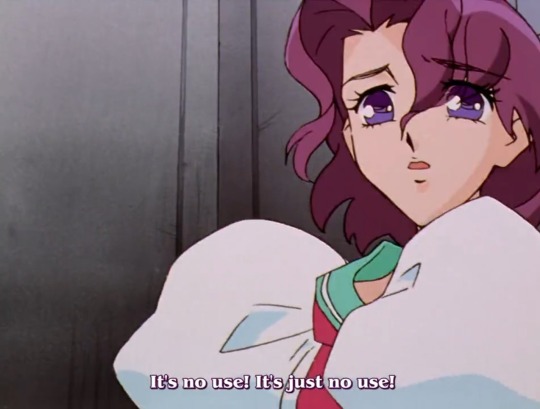
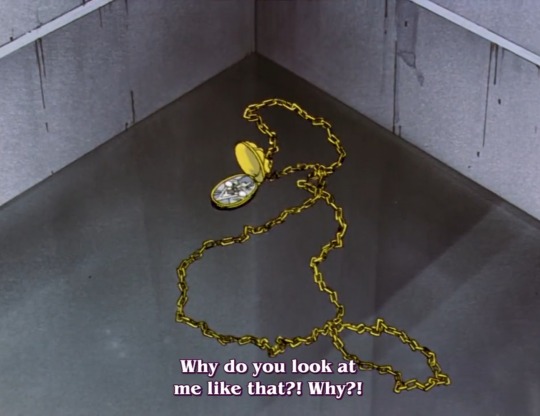
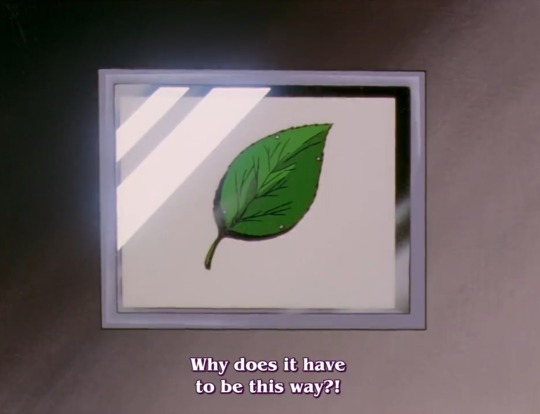
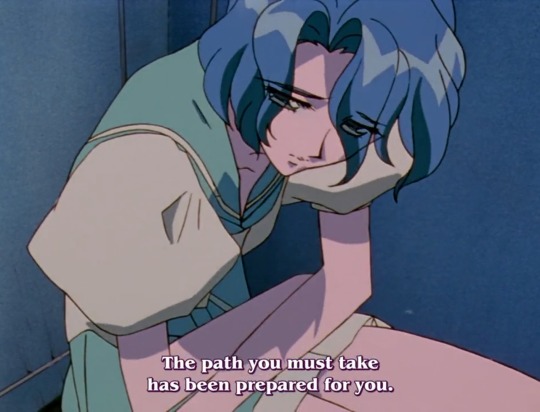
They key to understanding Shiori is noticing that she specifically doesn't want to acknowledge that Juri's feelings are reciprocated, and the obsession is mutual. If you paint their relationship as one sided, you're actually falling for her act.
4. She enters a relationship with Ruka.
Ruka is a handsome (arguable), respected boy who appears out of nowhere and starts showing interest in Shiori. It's obvious that for an insecure girl, who in addition struggles with confusing repressed feelings, this would be something unthinkably wonderful. The affection and praise she gets from him is exactly what her low self-esteem craves. You might be wondering why she didn't perceive Juri's feelings for her in the same way. And a part of the answer might be that, post nameless-boy-incident, Juri was nothing but cold to her. She might have been pining after Shiori from afar, but in the end she's distant and untouchable, and they're divided by their messy past. Meanwhile Ruka is a clean slate, seems openly affectionate, engaged in their relationship and he pays attention to her. But I think the main thing that makes Ruka so different from Juri is the fact that...he's a boy. Because, as Revolutionary Girl Utena establishes, gender plays a crucial role in interpersonal dynamics. Attention from a boy is fundamentally coded as romantic, desirable, necessary and most importantly: increases the girl's worth in society's eyes. It makes one a princess. Meanwhile Juri's advances could only be seen as an invitation to friendship, at best. But Juri's status and beauty make her special, while Shiori is not. Therefore, it can only be pity and mockery.
Of course, Ruka only uses Shiori to influence Juri and dumps her as soon as he achieves his goals. It's true that Shiori could have listened to Juri's warnings, but then again... why should she? From her perspective, Juri's her ex-friend that doesn't want anything to do with her, who only suddenly comes to Shiori when she's finally happy and fulfilled, and encourages her to end it. She doesn't know the wider context of the situation, nor does she remember the Black Rose arc. Juri's warnings don't sound sincere to her.
And so, Ruka gets rid of her in the coldest, most indifferent way, not explaining anything or showing even the slightest sign of compassion. Before that though, he makes an interesting remark, about Shiori putting on an act and polishing somebody else's sword.
Honestly, I don't really know how to interpret it in any other way than Shiori actually having feelings for someone else, despite trying her hardest to conceal it. Are my shipping lenses not allowing me to see any different possibilities? Am I going crazy? I don't know.
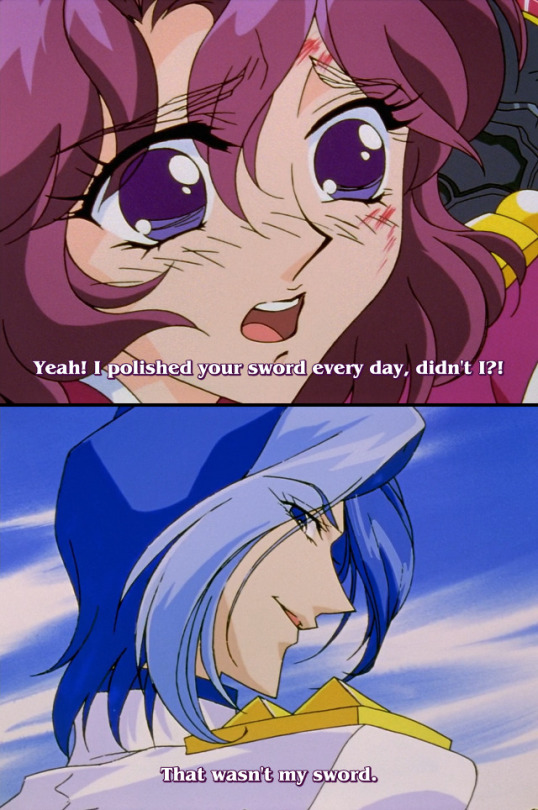
Nevertheless, Shiori begs him to stay, devastated. Her life got turned around so suddenly, she found appreciation, status, comfort and stability, and now all that's been taken away from her as abruptly as it was given. It's a public humiliation.
I once heard someone say that this would be the perfect moment for Juri to step in and defend her. And to be honest, although it may be true, I'm not completely sure. It may have been the one display of open care that Shiori needed from her, but it might as well have been interpreted by Shiori as Juri affirming her superiority over her and feeling sorry for her again. We will never know. In my opinion, so much of their relationship is going on in their own heads that the only thing that could ever cause positive progress is communication (which neither of them seem to be a fan of).
Instead, Juri only tries to console her after the fact, when Shiori's at her absolute lowest. In the context of all the assumptions Shiori holds and Juri's previous indifference, it quite understandably comes off as a sneering attempt to gloat.

That's about it. You may have noticed that I've summarized all Shiori's appearances into 4 points, and only one of them includes an instance of Shiori hurting Juri voluntarily, out of her own free will, not influenced by anyone. I'm not saying that she was forced to taunt Juri during the Black Rose Arc, I'm not trying to diminish the suffering she's caused or trying to paint her as a perfectly good person. I am trying to make it clear that she is not some cunning plotter, dedicating every minute of her life to finding ways to make Juri suffer that some people seem to take her for. I am trying to humanize people's perception of her a little bit. Especially considering the fact that last scenes of her include those when she waits for Juri and follows her so that they can go home together, and then joins the fencing club. If this doesn't show that she's capable of change, I don't know what does.
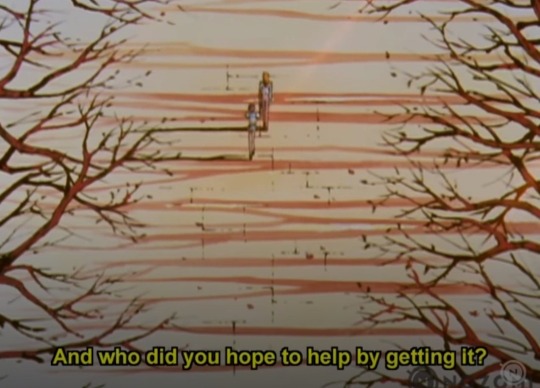
She's not an innocent princess, that's true, but she's not just an egoistical, manipulative liar either. She's a bit of both. After all, if Revolutionary Girl Utena is supposed to teach you anything, then I think it's that we're all just people, and the complexities of human experience make it impossible to fit anyone into a box, assigning them definite labels like "princess" or "witch".
And if you look at a teenage girl who, like all people in Ohtori, struggle under the system of patriarchy and heterosexuality, and all you see is a wicked, sinister witch, then you may have just fallen into the trap that the narrative had set for you.
#Shiori: I may be pathetic but you're the one who fell for me lol#no fr you don't need to make up reasons to hate shiori there's plenty enough right there in the text#rgu#revolutionary girl utena#shiori takatsuki#juriori#I guess#she's so fucked up I love her#like girl feeling delighted after finding out your bestie has a crush on you is not very straight no matter how you justify it#moje
528 notes
·
View notes
Text
Discworld/Good Omens parallels ramble
Exactly what it says on the tin! These are some fun little Discworld/Good Omens parallels that my brain picked up on at various times (usually 3 a.m. or thereabouts... Thanks, mum, for the persistent insomnia...)
Mild-to-moderate spoilers for Wyrd Sisters, Lords And Ladies, Men At Arms and Carpe Jugulum below the cut.
In A Life With Footnotes, the official biography of Terry Pratchett, Rob Wilkins mentions that when he was in school, a young Pterry wrote for English class a story (sadly lost to the mists of time) about orcs attacking a vicarage in full Jane-Austen-spoof fashion. Now, given how the Whickber Street Shopkeepers' Ball turned out, it seems reasonable to assume one of two things: a) this story was not a factor under consideration when writing S2 and the parallel is an ineffably delightful coincidence (a bit unlikely) b) this story *was* an inspiring factor in the writing of S2, and the nod to Pterry happened to work really well with the plot (seems a bit more likely). Either way, the parallel is there and giving me all of the warm fuzzies <3
There's an idea in Discworld, forming a significant part of the moral backbone of the series, that's very succinctly summed up by Granny Weatherwax in Carpe Jugulum: "[S]in [...] is when you treat people like things. Including yourself." This is absolutely at the core of what's wrong with Heaven and Hell and God and Satan in Good Omens; the leadership and culture of both organisations/cults treat everyone -- angels, demons and humans alike -- as disposable things to be used and toyed with and discarded or destroyed if they start having the temerity to be imperfect or form opinions or thoughts of their own.
There're two characters in Discworld who parallel Aziraphale surprisingly strongly: Magrat Garlick (of the Lancre witches) and Captain Carrot Ironfoundersson of the Ankh-Morpork City Watch. -*Magrat is viewed as a bit of a soft, soppy 'wet hen' by the other witches, but she is still a witch, with all that that implies. She also has at least one scene in every book in which she appears where she does something extremely badass and witchy; for example, turning an ancient wooden door back into a tree, or (very pertinently to GO) delivering a literally iron-clad punch to the face of a villain who's mentally torturing her with her own insecurities. Likewise, Aziraphale seems to mostly be viewed as a bit dull and wimpy by the other angels we see (though Magrat still has the genuine respect of her witchy peers) but he is still an angel -- a Principality -- with all the powers, steadfast guardianship and bloody-minded stubbornness of that rank. The Metatrash might not be vulnerable to iron in the same way as Discworld elves, but you can bet that his attempt to break Aziraphale and bring him into line is going to backfire just as spectacularly! *For the parallel between Aziraphale and Captain (well, Corporal, at this point in the Discworld timeline) Carrot, the novel I have in mind is Men At Arms. At one point, Vimes is being held at crossbow-point by a villain, and has a bout of internal monologuing about how, if someone has you at their mercy, you'd better hope they're evil, because that way they'll take time to gloat and mock you so you'll have an opportunity to think of a way out; a good man will kill you with barely a word. Carrot does exactly that at the climax of the plot, putting his sword through the villain and the stone pillar behind said villain without saying a thing. Now, Aziraphale might not quite have Carrot's 'incorruptible pure pureness' tendencies, but he is -- for all his flaws -- a good person. If he knows that something needs to be done to prevent an evil outcome, he will DO it without hesitation. He knows how to use a sword, too, and if That Frickin' Elevator Smile Of Tranquil Fury is any indication, the Metatrash is in far deeper doodoo than he realises! Related to the above, The Smile also reminds me of the old adage, "beware the fury of a patient man." (Well, man-shaped being in this case...) Very appropriate for our careful, thoughtful angel -- it would not surprise me (much) if Metatron were to depart the plot of S3 with a flaming sword pinning him to one of Heaven's columns (probably won't happen, but I can dream, eh?)
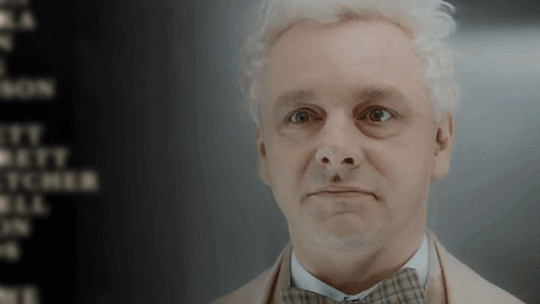
Hope you enjoyed reading all that :D
#good omens#good omens meta#discworld#aziraphale#crowley#ineffable husbands#granny weatherwax#magrat garlick#captain carrot#carrot ironfoundersson#terry pratchett#sir terry pratchett#pterry#gnu terry pratchett
91 notes
·
View notes